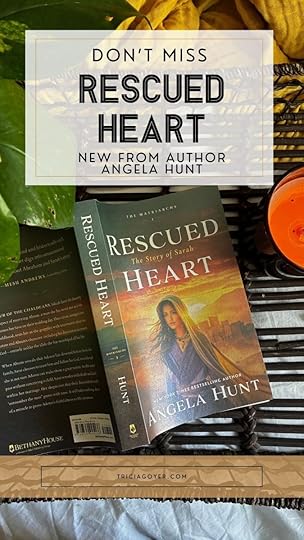Tricia Goyer's Blog, page 2
October 5, 2025
Writing Desk: Angela Hunt
 Tricia Goyer
Tricia GoyerChristy-Award winner Angela Hunt writes for readers who expect the unexpected in novels. With over five million copies of her books sold worldwide, she is the best-selling author of more than 165 works ranging from picture books (The Tale of Three Trees) to non-fiction books, to novels.
Now that her two children are grown, Angie and her husband live in Florida with Very Big Dogs (a direct result of watching Turner and Hooch and Sandlot too many times). This affinity for mastiffs has not been without its rewards–one of their dogs was featured on Live with Regis and Kelly as the second-largest canine in America. Their dog received this dubious honor after an all-expenses-paid trip to Manhattan for the dog and the Hunts, complete with VIP air travel and a stretch limo in which they toured New York City.
Afterward, the dog gave out pawtographs at the airport.
Angela admits to being fascinated by animals, medicine, psychology, unexplained phenomena, chickens, and “just about everything” except sports. Books, she says, have always shaped her life— in the fifth grade she learned how to flirt from reading Gone with the Wind. Her books have won the Christy Award, several Angel Awards from Excellence in Media, and the Gold and Silver Medallions from Foreword Magazine’s Book of the Year Award. In 2007, her novel The Notewas featured as a Christmas movie on the Hallmark channel. Romantic Times Book Club presented her with a Lifetime Achievement Award in 2006. She received a Lifetime Achievement Award from American Christian Fiction Writers in 2019.
Connect with Angela on her website, Instagram, Facebook, and BookBub, and don’t forget to subscribe to her newsletter.
More about Rescued HeartIn Ur of the Chaldeans, Ishcah faces the daunting prospect of marrying Abram, a man she has never met and who renames her Sarai on their wedding day. Their union, arranged since childhood, tests her as she grapples with uncertainty about her future and Abram’s character, including his devotion to an unseen God–entirely unlike the idols she has worshiped all her life.
When Abram reveals that Adonai has directed him to leave the family, Sarai chooses to trust him and follow his God, even though she is not sure Adonai can make them a great nation. As the years pass without conceiving a child, Sarai wrestles with doubt and faith within her marriage. Her skepticism that their descendants will “outnumber the stars” grows with time. It will take nothing short of a miracle to prove Adonai’s faithfulness to His promise.
Purchase a copy of Rescued Heart.
Enter to Win a Copy of Rescued HeartQ&A with Angela HuntARCF: Could you tell us a little about Rescued Heart and the inspiration behind it?
AH: For two years now, I have been worshipping at a small messianic synagogue. I have always had a deep love for the Jewish people, so it felt natural for me to join with them in worshipping our Messiah. Since attending the synagogue, I’ve developed a new respect for and knowledge of Jewish history . . . and I wanted to tell the story of Sarah,k Rebekah, and Rachel and Leah in a way that would be unfamiliar to most Christians.
ARCF: In Rescued Heart, Sarah faces a big leap of faith. What’s the biggest leap of faith you’ve taken in your own life?
AH: I quit a full time job to become a writer . . . in the hope that I would soon become a mother. We were on an adoption agency’s waiting list, so I decided that if I was ever going to become a writer—and a mom—I might as well step out and get started.
ARCF: If Sarah had a favorite modern-day comfort food, what do you think it would be?
AH: LOL! Probably pita bread and hummus!
ARCF: If Sarah had a social media account, what would her first post be?
AH: A bit of a tough question, since Sarah lived such a long time! But I think she’d write about Isaac. After waiting so long to have her son—ninety years!—after that, Isaac became the center of her world.
ARCF: What’s the most surprising thing you learned while researching Sarah’s story?
AH: In the course of my research, I discovered the ancient BOOK OF JASHER, which contains many stories about all the patriarchs. The first story to startle me was the story of how Abraham was cast into a fiery furnace, and Sarai came to faith when Adonai saved him out of that furnace. After all, she was from Ur, while Abram had been reared up in the mountains with Noah and Shem—another face I learned from THE BOOK OF JASHER.
ARCF: If Sarah were to write a letter to her future self, what advice do you think she’d give?
AH: My first inclination is to say that she’d warn her future self not to force Abraham to sleep with Hagar—but God uses even our mistakes for good, no? So I don’t think she’d change any of her decisions. She might, however, tell herself to relax and trust in the Lord.
ARCF: You’ve written over 160 books—what’s your secret to staying inspired and productive?
AH: The mortgage? Honestly. Writing is my job, and I get up and go to work every day just like everyone else who’s employed. It’s not romantic, but it’s what the Lord has given me to do.
ARCF: If you could live in any era of history, which would you choose and why?
AH: I love history, but I also appreciate the many conveniences we have today. As a storyteller, I don’t think I could function without my computer.
ARCF: If Sarah had a pet, what kind of animal do you think she’d have?
AH: She did have a pet, at least in my book. She had a kitten. Once they moved to the wilderness and lived in tents, I’m pretty sure she had a battalion of cats to take care of the rats in the storehouse—er, store tent.
ARCF: What’s the most unusual place or situation that has inspired one of your stories?
AH: Years ago, I learned about researchers who go to the top of the trees in the rain forest to study the unique plants and animals exclusive to that area—and I decided that I had to write a novel with that as a setting. The book is THE CANOPY, and I did spend a week in the rain forest to do research. It was fascinating!
ARCF: And finally, can you share what’s coming up next?
AH: With pleasure! Righteous Heart: The Story of Rebekah, is next and already written. After that will come Resolute Heart: The Story of Leah, and I’m working on that now. All of these women faced unique challenges and I am loving their stories.
Save, Pin, Share

 The post Writing Desk: Angela Hunt appeared first on Tricia Goyer.
The post Writing Desk: Angela Hunt appeared first on Tricia Goyer.
Carrying A Loved One’s Legacy Forward After Death
 Tricia Goyer“Therefore, since we are surrounded by such a huge crowd of witnesses to the life of faith… let us run with endurance the race God has set before us.” – Hebrews 12:1
Tricia Goyer“Therefore, since we are surrounded by such a huge crowd of witnesses to the life of faith… let us run with endurance the race God has set before us.” – Hebrews 12:1When someone you love steps into eternity, you’re left with both an ache and a gift. The ache is obvious—the empty chair, the missed phone calls, the voice you long to hear. But the gift is quieter, tucked into the lessons and love they left behind. That gift is their legacy.
Legacy Isn’t Just a WordWhen I think of my grandma, her legacy wasn’t about accomplishments, possessions, or titles. It was about who she was in the everyday. Her consistent prayers. Her grateful spirit. Her delight in the simplest blessings.
She didn’t leave behind riches for me to inherit—she left behind a well-worn path of faith to follow.
A Story from Walk It OutIn my book Walk It Out, I shared how Grandma’s faith showed up in ways both practical and profound. One of my favorite memories was of her joy in showing up. She didn’t need a special occasion to invest in people—she simply lived with open hands and an open heart.
I wrote about how she came alongside me when I was a young mom, reminding me that faith isn’t just taught in lessons but modeled in life. She would fold laundry with me, pray with me, or tell me stories about God’s faithfulness in her younger years. At the time, I didn’t realize those were seeds being planted deep in my own heart—seeds that would bloom later when I faced trials of my own.
That’s the power of legacy: it sneaks in through the ordinary. You don’t always see it until you need it.
The Power of Everyday FaithGrandma’s life taught me that legacies aren’t built in big moments but in small, daily acts of love.
She prayed for me and with me. Even in her weakest days, I could hear her whispering to Jesus. That faith shaped me more than any lecture ever could.She celebrated the ordinary. A meal with family became something sacred. Her joy over “Sunday dinner on a Tuesday night” taught me to savor what God provides.
She loved without hesitation. Whether it was her family, her neighbors, or her church, she gave freely.
Her faith wasn’t loud, but it was steady. And steady faith leaves a mark.
Carrying the TorchAs I move forward without her, I find myself asking: What part of her legacy can I carry forward?
When I pray aloud with my children, I’m echoing her prayers.When I pause to thank God for a simple meal, I’m carrying her gratitude.
When I choose love over bitterness, service over self, I’m continuing her story.
The legacy of a godly life doesn’t stop at the grave—it ripples through generations.
For the Grieving HeartFriend, if you’ve lost someone dear, you carry their story with you. And you get to decide how that story continues. You don’t need to replicate their life—but you can honor their legacy by letting their love and faith shape your own.
Perhaps it’s in the way you pray. Perhaps it’s in how you open your home. Perhaps it’s in how you speak kindness to others.
Their race may be finished, but you are still running yours. Let their faith strengthen your steps.
Reflection QuestionsWhat part of your loved one’s life most inspires you?How can you carry forward a piece of their legacy in your own family or community?
What is one small daily habit you could begin that would honor their memory?
A Prayer for Today
Lord, thank You for the legacy of faith my loved one left behind. Thank You for the lessons tucked into their prayers, their joy, their love. Help me to carry their legacy forward—not as a burden, but as a gift. Show me how to honor You with my life in ways that reflect what they taught me. Strengthen me to run with endurance the race You’ve set before me, until I too finish the journey and meet You face to face.
Amen.
My grandma’s hands are no longer folded in prayer here on earth, but her legacy continues in the prayers I pray, the faith I live out, and the love I offer to my family. That’s the beauty of legacy: it doesn’t end.
And someday, when I too see Jesus face to face, I’ll get to thank her for the way her faith helped guide me home.
“Therefore, since we are surrounded by such a huge crowd of witnesses to the life of faith… let us run with endurance the race God has set before us.” – Hebrews 12:1Want more insight? Join us on the Daily Bible podcast!  LISTEN &
LISTEN &  WATCH
WATCH
 Introducing the Daily Bible Podcast
Introducing the Daily Bible Podcast Audio Player!

Immerse yourself in God’s Word like never before with the MegaVoice Daily Bible Podcast Audio Player—a solar-powered, portable way to listen to the entire NIV Bible and the Daily Bible Podcast with Tricia Goyer and Michelle Hill!
 Unplug & Listen – Step away from digital distractions and enjoy an uninterrupted discipleship experience.
Unplug & Listen – Step away from digital distractions and enjoy an uninterrupted discipleship experience. Simple & Accessible – With easy controls, it’s perfect for all ages, including kids, seniors, and the visually impaired.
Simple & Accessible – With easy controls, it’s perfect for all ages, including kids, seniors, and the visually impaired. Listen Anywhere, Anytime – Solar-powered with up to 14 hours of battery life, plus a USB charging option for cloudy days.
Listen Anywhere, Anytime – Solar-powered with up to 14 hours of battery life, plus a USB charging option for cloudy days.
 Whether you’re at home, on a mission trip, or enjoying quiet time in nature, this MegaVoice Audio Bible Player helps you stay connected to God’s Word—without a screen!
Whether you’re at home, on a mission trip, or enjoying quiet time in nature, this MegaVoice Audio Bible Player helps you stay connected to God’s Word—without a screen!
 Get yours today and experience the Bible in a whole new way!
Get yours today and experience the Bible in a whole new way!
Matthew 13:10-23, Luke 8:9-18, Mark 4:21-29, Matthew 13:24-30, Mark 4:30-34, Matthew 13:31-52, Mark 4:35-41, Matthew 8:23-27, Luke 8:22-25
 Calm Despite the Storms
Calm Despite the Storms
As we dive into today’s readings, we encounter more of Jesus’ parables—stories that reveal deep truths about the Kingdom of Heaven and how we are to respond to God’s Word. These teachings remind us of the importance of a receptive heart, the power of faith, and the calm assurance that Jesus brings even in the midst of life’s storms.
The Parable of the Sower (Matthew 13:10-23, Luke 8:9-18, Mark 4:21-29)In this parable, Jesus explains how different types of soil represent different responses to God’s Word. Some people hear the message but don’t understand it, others receive it with joy but fall away when trouble comes, still others are choked by life’s worries, riches, and pleasures. But some people, like the good soil, hear the Word, understand it, and bear fruit.
This story is a powerful reminder that we need to prepare our hearts to receive God’s truth. It’s not enough to simply hear His Word; we need to understand it and allow it to grow within us. We also see this illustrated in the Parable of the Lamp, where Jesus teaches that truth is meant to be seen and understood, not hidden.
The Parable of the Mustard Seed and the Yeast (Mark 4:30-34, Matthew 13:31-52)Jesus also shares two more parables that describe the Kingdom of Heaven. The mustard seed, though tiny, grows into one of the largest plants in the garden. Similarly, the Kingdom of Heaven starts small but grows into something expansive and welcoming. In the same way, a little yeast works its way through the whole dough, transforming it.
These parables show us that small acts of faith, even seemingly insignificant, can grow into something far greater than we can imagine. God’s Kingdom is constantly growing, often in ways we cannot see, but it’s happening, and it will produce fruit.
The Parable of the Weeds (Matthew 13:24-30)In this parable, Jesus likens the Kingdom of Heaven to a field where good seed is sown, but an enemy sows weeds among the wheat. The farmer advises letting both grow together until the harvest, when they will be separated—the wheat gathered into the barn and the weeds burned. This parable teaches us about the final judgment, where the righteous will be separated from the wicked. It reminds us to be vigilant in our faith and to persevere, knowing that God will ultimately bring justice.
Calming the Storm (Mark 4:35-41, Matthew 8:23-27)One of the most well-known stories from today’s reading is when Jesus calms the storm. As Jesus and His disciples are out on the sea, a fierce storm arises. The disciples, terrified, wake Jesus, who is sleeping peacefully. Jesus stands, rebukes the wind and the waves, and says, “Peace, be still.” The storm stops, and the disciples are left in awe.
This story serves as a powerful reminder that even when life’s storms rage, Jesus is in control. He can calm the storms in our hearts and minds with just a word. The question for us is: Are we trusting in His power, or are we letting fear take over?
Word of the Day: CalmDefinition: To be free from nervousness or fear.
It’s the kind of peace we can have when we trust Jesus, even when everything around us seems out of control.
“Peace, be still.” – Mark 4:39Cultivating a Heart of UnderstandingWe’ve all had seasons where it’s difficult to focus on God’s Word, where worries and distractions choke out our faith. But just like the good soil in the Parable of the Sower, we need to prepare our hearts to receive and understand God’s truth. It’s easy to let life’s thorns—worries, wealth, and temporary pleasures—steal our attention from God’s Word, but He calls us to focus on Him.
Today, take a moment to ask the Holy Spirit to soften any hard places in your heart. Let Him break up the rocky or thorny ground and allow His Word to take root. As we do, we’ll begin to see fruit in our lives—peace, joy, and understanding that comes from a deeper relationship with Jesus.
Trusting in Jesus’ CalmWhen the storms of life arise—whether it’s financial struggles, family conflict, or overwhelming anxiety—Jesus offers us calm. Just as He calmed the wind and the waves, He can calm our hearts when we feel out of control.
What do you need to bring to Jesus today? Take your worries, your fears, and your struggles to Him. He invites you to experience His peace. When we trust Him, we realize that He is our Rock, the One who controls the storms and keeps us steady.
Faith, like a mustard seed, may seem small, but when we plant it, it grows into a tree of strength and shelter. Today, plant that seed of faith. Trust that Jesus will bring calm in your storm, and remember that even when we don’t see it, God’s Kingdom is growing.
October 7Mark 5:1-20, Matthew 8:28-34, Luke 8:26-39, Mark 5:21-43, Matthew 9:18-26, Luke 8:40-56
 Incredible Transformations
Incredible Transformations
Today’s readings are packed with incredible stories of transformation—stories where people who were once broken, sick, and even dead were radically changed by encountering Jesus. These miracles are not just physical healings; they represent deep spiritual changes that demonstrate Jesus’ power over evil, sickness, and death.
Jesus Heals the Demon-Possessed Man (Mark 5:1-20, Matthew 8:28-34, Luke 8:26-39)In these passages, we see a man possessed by a legion of demons living in torment, completely isolated from society. No one could control him, and he wandered among the tombs, unable to live a normal life. Yet when Jesus approached, even the demons recognized His authority, calling Him by name—“Jesus, Son of the Most High God.”
Jesus, in His mercy, frees the man from the demons, sending them into a herd of pigs, which plunge into the sea. While this terrified the local people—who were more comfortable with a tormented man in their midst than with the power of Jesus—the transformation was undeniable. The man who had been living in chaos and madness was now calm, clothed, and in his right mind.
The people of the town asked Jesus to leave, but the healed man wanted to follow Jesus. Instead, Jesus told him to go home and share what God had done for him. This man became a living testimony of transformation—a beacon of hope in his community.
Two Miracles in One Journey (Mark 5:21-43, Matthew 9:18-26, Luke 8:40-56)As Jesus continued His ministry, He was approached by Jairus, a synagogue leader whose daughter was gravely ill. Jairus’s faith led him to beg Jesus for healing. But along the way, another miracle took place. A woman who had been suffering from a bleeding disorder for twelve years reached out to touch Jesus’ garment. Her faith was simple: if she could just touch Him, she believed she would be healed. And she was!
Jesus, sensing the power had gone out from Him, stopped and commended her faith. Meanwhile, Jairus received the devastating news that his daughter had died. But Jesus wasn’t done. He went to Jairus’s house, told him not to be afraid, and raised the little girl from the dead. Imagine the joy, relief, and awe her parents must have felt!
Each of these stories shows us Jesus’ power to bring about not just healing, but total transformation.
Word of the Day: TransformationDefinition: The induced or spontaneous change of one element into another by a nuclear process.
In today’s readings, the transformations we witness are nothing short of miraculous—people going from madness to peace, sickness to healing, and death to life. When Jesus steps into our lives, His transformative power is radical and complete. He doesn’t just make slight improvements; He changes us from the inside out, just like a nuclear process transforms one element into another.
The Power of TransformationThese miracles reveal a theme of transformation that goes far beyond physical healing. The demon-possessed man went from chaos to peace, the woman with the bleeding disorder went from untouchable to whole, and Jairus’s daughter went from death to life. Each of these transformations reflects the change that Jesus brings to our lives.
The truth is, Jesus still transforms lives today. He takes our brokenness, our sickness, our isolation, and even our spiritual death and replaces them with peace, healing, community, and new life.
Transformation in Our LivesTransformation in our lives isn’t just about outward changes; it’s about inner restoration. When we come to Jesus—whether we are feeling broken, isolated, or lost—He offers us the same transformation He gave to those we read about today. The demoniac’s chaos became peace, the woman’s sickness became health, and Jairus’s grief was replaced with joy.
Like these people, we too can experience transformation through faith in Jesus. Whether we are struggling with internal chaos, external trials, or fear, Jesus has the power to turn things around. Sometimes the change is dramatic, other times it’s gradual, but one thing remains: Jesus is always working to transform us into reflections of His love, peace, and power.
New CreationsTransformation can be both spontaneous and induced—sometimes it comes after a dramatic encounter with God, and other times it’s a process that unfolds over time. But whether quick or slow, the change Jesus brings is thorough. It’s not just a shift; it’s a complete reworking of who we are. In physics, the word transformation refers to the change of one element into another by a nuclear process. This is fitting when we consider the power of Christ’s work in our lives.
We’re not just slightly improved versions of ourselves; in Christ, we are new creations. And this transformation, once begun, is ongoing. He continues to change us, molding us into His likeness, and allowing us to live out the fullness of the life He has called us to.
October 8Matthew 9:27-34, Mark 6:1-6, Matthew 13:53-58, Matthew 9:35-38, Mark 6:7-13, Matthew 10:1-42, Luke 9:1-6
 The Authority of Jesus
The Authority of Jesus
Today’s reading takes us deeper into understanding the authority of Jesus and how He used it not just to heal but to bring about transformation in people’s lives. We see a variety of stories that demonstrate His compassion, His power, and how the people around Him responded to that authority.
Two Blind Men and a Mute Man (Matthew 9:27-34)The first story centers around two blind men who cry out to Jesus, calling Him the “Son of David”—a Messianic title that shows they recognized His authority and power to heal. Jesus asks if they believe He can do this, and when they affirm their faith, He heals them. “Because of your faith, it will happen,” Jesus says, emphasizing the connection between faith and healing.
In the same passage, we also read about a demon-possessed man who is brought to Jesus. After Jesus casts out the demon, the man who had been mute begins to speak. While the people are amazed, the Pharisees accuse Jesus of casting out demons by the ruler of demons. This reflects a deeper theme of the honor-shame dynamic at play. Jesus was challenging the established religious authority, and this did not sit well with the Pharisees. But to the crowds, Jesus’ power and authority were undeniable.
Returning Home: Honor and Unbelief (Mark 6:1-6)Next, we read about Jesus returning to His hometown of Nazareth, where He is met with skepticism. Despite His astonishing teachings, the people couldn’t get past their familiarity with Him. “He’s just a carpenter, the son of Mary,” they scoffed. In an honor-shame society, Jesus’ claim to authority was met with dishonor in His own hometown. They were offended, and their lack of faith limited what Jesus could do there.
This passage highlights how familiarity can breed contempt. The people of Nazareth could not reconcile the Jesus they grew up with and the rabbi performing miracles before them. And because of their lack of honor and faith, they missed out on the fullness of what Jesus could have done in their lives.
Sending Out the Disciples: Jesus Shares His Authority (Mark 6:7-13, Matthew 10:1-42, Luke 9:1-6)One of the most significant moments in today’s reading is when Jesus commissions His disciples, giving them the same authority He has—authority to heal the sick, raise the dead, and cast out demons. This is the first time in Matthew’s Gospel that the twelve disciples are called apostles, which means “ones who are sent out.”
Jesus instructs them to go to the lost sheep of Israel and to proclaim that the Kingdom of Heaven is near. He warns them that they will face persecution but assures them that they should not be afraid of those who can only kill the body, for God will take care of their souls. His final instruction is both challenging and comforting: “Whoever acknowledges me before others, I will also acknowledge before my Father in heaven.”
This delegation of authority is profound. Jesus did not just perform miracles Himself; He empowered His followers to do the same, and He does the same for us today. As His disciples, we carry His authority with us to bring light, healing, and the Good News to a world in desperate need.
Word of the Day: AuthorityDefinition: The power or ability to do something, given by or derived from a higher authority.
In today’s reading, we see Jesus not only demonstrating His divine authority but also sharing it with His disciples. Whether it was healing the blind, casting out demons, or sending His disciples to spread the Good News, Jesus’ authority was evident in everything He did. But His authority wasn’t just about power; it was about serving, healing, and freeing others.
Trusting the Authority of JesusImagine being touched by Jesus. His touch carried authority, as we saw when He healed the blind men and the mute man. But in the society He lived in, authority was tied to honor. Jesus didn’t just perform miracles—He was constantly in an “honor contest” with those around Him, especially the Pharisees. Yet, despite the challenges, Jesus continued to demonstrate His authority through love and compassion.
How are we responding to Jesus’ authority in our lives today? Are we honoring Him by trusting His power to heal and restore, or are we holding back, skeptical like the people of Nazareth?
As His followers, we have two choices:
Trust the authority of Jesus and honor Him with our faith and actions.Deny His authority because we don’t fully understand it.Even when we don’t understand, Jesus remains sovereign. His authority is not dependent on our belief—it is inherent in who He is. But when we align ourselves with His authority, we open ourselves up to experience His power in profound ways. And just as He sent His disciples out with authority, He has also given us the authority to be light bearers and chain breakers in the world today.
Living with Humble AuthorityJesus’ authority wasn’t about domination—it was about service and love. He didn’t just heal and cast out demons for the sake of displaying power; He did it to set people free. When He sent out His disciples, He equipped them to serve others with the same heart of compassion.
In our own lives, we are called to exercise the authority given to us by Jesus. Whether it’s sharing the Good News, serving those in need, or praying for healing, we have the same power at work within us. But this authority is to be used with humility and a heart of service, always pointing back to Jesus, the source of that power.
October 9Luke 9:7-9, Mark 6:14-29, Matthew 14:1-21, Mark 6:30-44, Luke 9:10-17, John 6:1-15, Mark 6:45-52, Matthew 14:22-33, John 6:16-21, Mark 6:53-56, Matthew 14:34-36
 Leftovers of Faith
Leftovers of Faith
Today’s reading highlights some of the most remarkable moments in Jesus’ ministry. From feeding thousands to calming storms, we witness not only His miraculous power but also His deep compassion for those around Him. Let’s dive into these stories and reflect on the “leftovers”—the overflow of God’s grace in our lives.
The Feeding of the 5,000: An Abundance of Leftovers (Mark 6:30-44, Luke 9:10-17)The story of Jesus feeding over 5,000 people with just five loaves and two fish is one of the most well-known miracles in the Bible. The people were so eager to follow Jesus that they didn’t even think about bringing food. After all, they were in the presence of the One who spoke with authority, healed the sick, and revealed God’s love in powerful ways.
What amazes me about this story is not just the miracle of multiplication but the fact that there were leftovers—twelve baskets full. Jesus didn’t just provide enough for the crowd; He provided more than enough. This overflow is a reminder that God’s provision always surpasses our needs. Jesus could have given the exact amount, but He left an abundance. This teaches us that God is not a God of scarcity. He gives generously and beyond what we could ever imagine.
Jesus Walks on Water: Facing Real and Imagined Fears (Mark 6:45-52, Matthew 14:22-33, John 6:16-21)After feeding the crowd, Jesus sends His disciples across the Sea of Galilee while He stays behind to pray. In the middle of the night, as the disciples struggle against the wind and waves, Jesus walks out to them on the water. At first, they are terrified, thinking He’s a ghost. But Jesus reassures them with these words: “Take heart; it is I. Do not be afraid.”
Peter, full of faith, steps out onto the water but quickly falters when he realizes the danger around him. Yet even in his doubt, Jesus reaches out and saves him. This scene illustrates not only the power of Jesus but also His willingness to meet us in the middle of our fears—both real and imagined.
Just as Herod was haunted by the ghost of John the Baptist, fearing that Jesus was John raised from the dead, we, too, can be plagued by fears that stem from our own guilt or misunderstandings. But Jesus calms our fears and holds us up, even when our faith falters. He reassures us that, in Him, we have nothing to fear.
Jesus’ Compassion for the Left Behind (Mark 6:53-56, Matthew 14:34-36)When Jesus and His disciples arrive on the other side of the lake, people immediately recognize Him and bring their sick to be healed. These were the forgotten, the marginalized, the “leftovers” of society. Yet, Jesus doesn’t ignore them. Instead, He heals them with compassion, fulfilling the prophecy of the Messiah who cares for the sick and the needy.
Psalm 102:16-17 says:
“For the LORD will rebuild Jerusalem. He will appear in His glory. He will listen to the prayers of the needy. He will not reject their pleas.”Jesus lived out this compassion, healing those who were considered the least and the last, showing that no one is beyond His care.
In many ways, we are all “leftovers”—people who have been cast aside by the world, burdened by our mistakes, or weighed down by life’s challenges. But Jesus reaches out to us, not with judgment, but with love and healing. His compassion is a sign of His Messianic mission and a reminder that He cares for each of us personally.
Word of the Day: LeftoversDefinition: Something, especially food, remaining after the rest has been used or consumed.
In today’s reading, we see that Jesus not only provides enough, but He provides more than enough. The twelve baskets of leftovers gathered after the feeding of the 5,000 symbolize the abundance of God’s provision in our lives. But what about the “leftovers” of our own hearts—the doubts, fears, and mistakes that weigh us down? Jesus, in His compassion, reaches out to us even in our brokenness, offering healing and restoration. His love doesn’t run out; it overflows.
Trusting in the Overflow of God’s ProvisionWhen I think of leftovers, I think of abundance—more than enough to go around. Jesus didn’t just meet the needs of the crowd; He exceeded them. And the same is true for us. Often, we focus on what we lack instead of what God has already provided in abundance. We forget that He is the God who gives more than we can ever ask or imagine.
But it’s not just about physical provision. Jesus also meets us in the emotional and spiritual “leftovers” of our lives—the places where we feel broken, lost, or forgotten. Whether it’s the fear that grips us in the middle of life’s storms or the shame that lingers from past mistakes, Jesus reaches out with compassion, calming our fears and bringing peace.
Just as He walked on water to be with His disciples, Jesus comes to us in the middle of our struggles, saying, “Take heart; it is I. Do not be afraid.” He is with us, even in the storms of life, and He has the power to calm the chaos around us.
Compassion for the “Leftovers”As we read about the people who rushed to Jesus for healing, we are reminded that He cares for those whom society overlooks—the “leftovers.” These were people who had no honor, no status, and no hope. Yet, Jesus didn’t turn them away. He healed them, showing that His love and compassion extend to everyone, regardless of their status or situation.
In the same way, we are called to reflect that compassion in our own lives. Who are the “leftovers” in our world—the people who are overlooked, marginalized, or forgotten? How can we, as followers of Christ, extend His love and compassion to them?
As we trust in the overflow of God’s provision for ourselves, let’s also be generous in sharing that overflow with others. Whether it’s through acts of kindness, words of encouragement, or simply being present with someone in need, we have the opportunity to be vessels of God’s love in a world that so desperately needs it.
October 10John 6:22-71, Mark 7:1-23, Matthew 15:1-20
 Jesus’ Call to Our Hearts
Jesus’ Call to Our Hearts
In today’s readings, Jesus offers profound insights into what truly matters—our hearts. The physical bread that sustains us is fleeting, but the spiritual nourishment Jesus offers leads to eternal life. As we dig deeper into His teachings, we’re called to examine our hearts and our hunger for God.
Jesus: The Bread of Life (John 6:22-71)After feeding the 5,000, the crowd follows Jesus across the Sea of Galilee. When they find Him, they are hungry—physically and spiritually. Jesus points out that they are seeking Him because they ate their fill of bread, but He wants them to hunger for something more: eternal life. Jesus declares:
“I am the bread of life. Whoever comes to me will never go hungry, and whoever believes in me will never be thirsty.” (John 6:35)This statement carries great weight. Jesus is not just another teacher; He is the source of life itself. The crowd, however, struggles with His words, especially when He talks about eating His flesh and drinking His blood. This teaching is difficult, and many turn away, unable to accept it.
But Jesus doesn’t back down. His message is clear—eternal life comes only through Him, the true bread from heaven. In the end, it’s Peter who acknowledges what the others could not:
“Lord, to whom shall we go? You have the words of eternal life.” (John 6:68)Jesus’ invitation is open to all, but it’s not always easy to accept. He calls us to place our faith in Him completely, to trust Him as the Bread of Life that sustains us.
The Pharisees and the Heart of the Matter (Mark 7:1-23, Matthew 15:1-20)While Jesus teaches about the internal transformation needed to enter the kingdom of God, the Pharisees are caught up in external rituals. They question why some of Jesus’ disciples don’t follow the traditional hand-washing rules. Jesus uses this as an opportunity to reveal a deeper truth:
“It is not what goes into your body that defiles you; you are defiled by what comes from your heart.” (Mark 7:15)The Pharisees were so focused on outward appearances—following traditions and rituals—that they missed the importance of inner purity. Jesus points out their hypocrisy, quoting Isaiah:
“These people honor me with their lips, but their hearts are far from me.” (Mark 7:6)What truly matters to God is the state of our hearts. Jesus lists the sins that flow from a corrupt heart—immorality, greed, deceit, envy, pride. These are what defile us, not whether we follow every religious rule to the letter.
Word of the Day: HeartDefinition: The center of the total personality, especially with reference to intuition, feeling, or emotion.
The heart is central to everything Jesus teaches. In the Bible, the heart is not just a physical organ but the seat of life, emotion, and morality. It’s where our true character resides. As Jesus explains:
“For from within, out of a person’s heart, come evil thoughts.” (Mark 7:21)But Jesus also offers hope. He doesn’t just point out the problem; He offers the solution. Through Him, we can receive a new heart—one that is pure, one that reflects His love and grace.
“I will give you a new heart and put a new spirit in you; I will remove from you your heart of stone and give you a heart of flesh.” (Ezekiel 36:26)Feeding Your Heart with the Bread of LifeThe world offers many distractions—just like the Pharisees’ focus on traditions, we too can get caught up in external appearances, in rules and routines. But Jesus calls us to something deeper. He wants our hearts, not just our actions.
As someone who grew up in church, I often heard about the “rules” but missed the “heart” of the gospel. Jesus doesn’t want us to be perfect rule-followers; He wants us to be transformed from the inside out. He wants us to hunger for the Bread of Life, to seek nourishment that lasts for eternity.
It’s easy to polish the outside, but what about the inside? Are we allowing Jesus to transform our hearts? Are we letting His Spirit cleanse us, renew us, and make us whole?
Prayer for the HeartOctober 11Lord, guide my heart’s desires. Let it hunger for You alone, the true Bread of Life. Help me not to be swayed by external rituals but to seek a genuine relationship with You. Cleanse and renew my heart daily, making it a vessel of Your love and light. Amen.
Mark 7:24-30, Matthew 15:21-28, Mark 7:31-37, Matthew 15:29-31, Mark 8:1-10, Matthew 15:32-16:4, Mark 8:11-21, Matthew 16:5-12
 Trusting in Jesus’ Orders
Trusting in Jesus’ Orders
Today’s readings are packed with rich lessons that span faith, compassion, and obedience. Jesus continues His ministry, traveling outside Jewish territory, performing miracles, and confronting misunderstandings from the religious leaders. As we explore these passages, one thing stands out—Jesus gives orders, but these are not the harsh commands of an authoritarian. Instead, they are invitations to receive His grace, provision, and healing.
The Canaanite Woman’s Faith (Mark 7:24-30 & Matthew 15:21-28)In a surprising turn of events, Jesus travels to Tyre, a Gentile region, and encounters a Canaanite woman whose daughter is demon-possessed. At first, Jesus seems reluctant to help, stating that His mission is to the Jews. But the woman’s faith is unshakable. She persists, acknowledging Jesus’ authority and pleading for His mercy.
Jesus finally responds to her faith, healing her daughter. This story teaches us about the power of persistent faith. Even when the answer doesn’t come immediately, and even when cultural or religious boundaries seem to stand in the way, faith can break through. The woman’s humility and perseverance provide a powerful example of how we should approach God with our requests.
What’s even more profound is that this Gentile woman recognized Jesus as the “Son of David”—a Messianic title. She knew she had no claim to the Jewish Messiah, but her faith transcended cultural boundaries. Jesus was moved by her belief, showing us that faith, not ethnicity or background, is what matters to God.
Healing the Deaf Man (Mark 7:31-37 & Matthew 15:29-31)Next, Jesus travels to the Decapolis, another Gentile region, where He heals a man who is deaf and has a speech impediment. In this intimate and personal miracle, Jesus takes the man aside, touches his ears and tongue, and orders his healing. The result? The man is immediately able to hear and speak clearly.
The people’s reaction is beautiful: “He has done everything well!” (Mark 7:37). This is a moment of collective honor for Jesus. Even in Gentile territories, people recognize His authority and compassion. Jesus doesn’t just perform miracles for show—He restores lives, one person at a time.
This healing reminds us of how deeply personal Jesus’ miracles are. He didn’t just perform acts of healing in a distant, impersonal way. He touched the man, engaged with him, and gave him back his ability to fully participate in life. It’s a reminder that Jesus sees us individually, and He cares deeply about our specific needs.
Feeding the 4,000: More Than Just a Meal (Mark 8:1-10 & Matthew 15:32-16:4)The next passage shows Jesus feeding another large crowd—this time 4,000 men, not including women and children. The disciples are again puzzled, wondering how they will feed so many people with only seven loaves and a few fish. But just like before, Jesus gives thanks, breaks the bread, and provides for everyone. And, again, there are leftovers—seven baskets full.
This miracle shows that Jesus doesn’t just meet needs; He exceeds them. The crowd didn’t just get enough to survive—they were filled, and there was abundance left over. Jesus is a provider who works in abundance, even when our resources seem limited. It’s a reminder to trust Him, even when we can’t see how the problem will be solved.
Beware of the Yeast of the Pharisees (Mark 8:11-21 & Matthew 16:5-12)After this miracle, the Pharisees come to test Jesus, demanding a sign from heaven. But Jesus refuses. He knows that no sign will satisfy their hardened hearts. They are not seeking truth—they are seeking to discredit Him.
Jesus then warns His disciples to beware of the “yeast” of the Pharisees and Herod. Yeast, in this context, symbolizes the corrupting influence of pride and hypocrisy. The Pharisees and Herod both sought power and authority, but for selfish reasons, not for God’s glory.
Jesus wants His followers to be vigilant and discerning, not allowing the pride and self-righteousness of the Pharisees to influence them. It’s a call for us to guard our hearts against anything that might puff us up or lead us away from the humility and faith that Jesus desires.
Word of the Day: OrderedDefinition: An authoritative direction or instruction; command; mandate.
Today’s readings highlight a recurring theme: Jesus gives orders. But His orders aren’t burdensome—they are invitations to receive His blessings.
In each miracle, Jesus issues a command: He tells the Canaanite woman to go, her daughter is healed; He orders the deaf man’s ears to be opened; He commands the crowd to sit and eat. Even when He warns about the yeast of the Pharisees, He is giving a directive to protect His disciples.
When Jesus orders something, it’s always for our good. He commands, not out of control or domination, but out of love and compassion. He wants to provide, heal, and guide us. But just like the Canaanite woman, we need to come to Him with faith, believing that His ways are best.
Obeying the Gentle Orders of JesusWhen Jesus orders us to trust Him, to follow His Word, or to step out in faith, how do we respond? Do we hesitate, like the disciples did when they wondered how the crowd would be fed? Or do we follow His orders with faith, like the Canaanite woman, who persisted even when the answer wasn’t immediate?
Jesus’ commands are not meant to limit us but to free us. They are invitations to experience His abundance, His healing, and His provision. We are called to trust His authority and to know that He always works for our good.
October 12Mark 8:22-30, Matthew 16:13-20, Luke 9:18-20, Mark 8:31-9:1, Matthew 16:21-28, Luke 9:21-27, Mark 9:2-13, Matthew 17:1-13, Luke 9:28-36
 What Is Worth More Than Your Soul?
What Is Worth More Than Your Soul?
As we walk through today’s scripture readings, there’s a theme that stands out: worth. Jesus calls us to reflect deeply on this question: “Is anything worth more than your soul?” It’s a question that asks us to weigh the eternal against the temporary, to measure the value of a soul—our soul—against the fleeting things of this world. Let’s dive into the heart of these passages and explore how Jesus reveals the true worth of our lives.
The Blind Man in Bethsaida (Mark 8:22-30)The healing of the blind man in Bethsaida is intriguing because it happens in two stages. After Jesus leads the man outside the village and touches his eyes, the man initially sees people, but they appear like trees walking around. Jesus touches him again, and his sight is fully restored.
This gradual healing mirrors our spiritual journey. Sometimes, our understanding of Jesus and our faith grow in stages. We may not see clearly at first, but with time and more “touches” from Jesus, we begin to understand who He is and the depth of His love for us. This reminds us that faith isn’t always instantaneous. It grows and develops as we continually seek Jesus.
Then, Jesus asks His disciples a crucial question:
“Who do you say that I am?” (Mark 8:29)Peter answers, “You are the Messiah.” This was the moment Peter fully recognized Jesus’ identity, though he did not yet understand the full scope of what that meant. It’s easy to say the right things, but truly understanding and living out that truth is the greater challenge.
Take Up Your Cross (Mark 8:31-9:1)Jesus goes on to predict His death, and Peter rebukes Him, not understanding why the Messiah would suffer. Jesus responds sharply:
“Get behind me, Satan! You do not have in mind the concerns of God, but merely human concerns.” (Mark 8:33)This rebuke reminds us of how often we view life from a limited, earthly perspective, rather than from God’s eternal viewpoint.
Jesus then calls His followers to a radical discipleship:
“Whoever wants to be my disciple must deny themselves and take up their cross and follow me.” (Mark 8:34)Following Jesus isn’t about comfort or earthly success. It’s about sacrifice, surrender, and a willingness to lose one’s life for His sake. This is where Jesus asks the profound question:
“What good is it for someone to gain the whole world, yet forfeit their soul?” (Mark 8:36)We often invest so much in temporary things—success, material possessions, human approval—yet Jesus reminds us that none of these are worth the value of our soul. Nothing in this world is more valuable than our relationship with God. Our soul’s worth is immeasurable, and it’s worth surrendering everything to follow Jesus.
The Transfiguration (Mark 9:2-13)Six days later, Jesus takes Peter, James, and John up a mountain where they witness His transfiguration. Jesus’ face shines like the sun, and His clothes become dazzling white. Moses and Elijah appear, representing the Law and the Prophets, and a voice from heaven says:
“This is my Son, whom I love. Listen to Him!” (Mark 9:7)In this moment, the disciples catch a glimpse of Jesus’ divine glory, confirming His identity as the Son of God. The transfiguration emphasizes Jesus’ worth—He is not just a teacher or prophet; He is God’s beloved Son, the fulfillment of all God’s promises.
Peter, eager to memorialize the moment, suggests building shelters. But the glory of God is not something to capture or contain. It’s not a memory to hold onto but a living reality to experience in our everyday lives. Just as the disciples needed to listen to Jesus in that moment, we too are called to listen to Him in our lives, letting His Word guide us in all that we do.
Word of the Day: WorthDefinition: The value of something.
Today, Jesus challenges us to consider the worth of our soul. In a world that constantly pressures us to chase after material success, Jesus asks us to pause and reflect: Is anything worth more than your soul?
Jesus’ miracles—healing the blind man, feeding thousands, and showing His glory in the transfiguration—demonstrate His deep care for our souls. Our souls are of such value to Him that He was willing to lay down His life for us. This is the ultimate demonstration of worth.
The Canaanite woman in today’s reading also demonstrates the worth of relentless faith. Her daughter’s healing came through her persistence, even when Jesus seemed indifferent at first. She understood that Jesus was her only hope, and she was willing to push through cultural boundaries to receive His mercy.
What Is Worth More?Jesus’ question lingers: “What is worth more than your soul?” It’s easy to get caught up in the day-to-day demands of life—work, responsibilities, relationships. But we must remember that our soul is eternal, and the only thing worth living for is Jesus. He is the one who gives our soul its true value.
Are we like Peter, recognizing Jesus as the Messiah but still holding onto our limited view of life? Are we willing to surrender our lives, take up our cross, and follow Him? Or are we still chasing after things that, in the end, will not matter?
Let’s reflect on the worth of our souls today and how we can live in a way that honors the One who gave His life for us.
The post Carrying A Loved One’s Legacy Forward After Death appeared first on Tricia Goyer.October 3, 2025
Come on Home with Jessica Smartt
 Tricia Goyer
Tricia GoyerListen to the episode with Jessica Smartt here.
About Come On Home
Family doesn’t have to be perfect to be strong.
We all have our own ideas of what a “strong family” is―but too often, the picture in our minds seems desperately far from our real lives. We long to build a home that our children want to come back to, a healthy environment where they can make mistakes and try again. We long for a place of unconditional love, a foundation to launch them into this crazy world without feeling lost or untethered.
But how? And what if you feel like it’s too late?
Beloved author of Memory Making Mom Jessica Smartt is right there with you in the trenches of parenting and family life. She has great news: a strong family culture has nothing to do with flawless behavior, a Pinterest-perfect home, or continual harmony. In Come on Home, Jessica will equip parents to create the family they long for, with the people in their actual homes. It’s never too late to build a strong family.
Based on statistics, jam-packed with concrete examples, and infused with Jessica’s trademark down-to-earth humor, Come on Home will help you discover:
thirteen foundational characteristics like prayer, friendship, and loyalty for a close-knit family, or what a family needs to grow stronginterviews with different kinds of strong families from all backgrounds and circumstancesnew patterns of discipline that hold boundaries without sacrificing connectionpractical, doable ideas to build strong relationships between family members, raising siblings who look out for one another, are good friends, and create lasting bondsprinciples for moving beyond unhealthy familial cycles to give your kids a new legacyWhile building a family will feel hard at times, it will be worth it. It’s never too late to give our children a soft place to land, a foundation of faithfulness and grace.
Purchase a copy of Come on Home here.
Connect with Jessica Smartt
Website | Podcast | Facebook | Instagram
Jessica Smartt is the author of Memory-Making Mom and Let Them Be Kids (ECPA Bestseller). She lives in sunny North Carolina on a family farm with horses, chickens, and an ever-increasing number of beloved cats. She and her husband, Todd, have three kids whom they homeschool. She is passionate about energizing everyday moms to save childhood and build close-knit families. Jessica loves bike rides, spinach quiche, a clean kitchen, being warm, national parks, and food that anyone else made.
October 1, 2025
Teaching Compassion Through Our Past
 Tricia Goyer
Tricia GoyerIt’s October, the season of change—cooler mornings, earlier sunsets, fresh planners, sharpened pencils, and fall routines settling in. While January 1 may mark the calendar’s “new year,” October often feels like the real beginning for homeschool moms like me. It’s when we finally feel our rhythm returning after the unstructured chaos of summer.
And this fall, while beginning a new Bible reading plan, I started in an unexpected place: Matthew 1.
Let’s be honest, the genealogies aren’t usually where we expect to find inspiration. But there, tucked in verses we often skim, God spoke deeply to my heart.
"Salmon the father of Boaz, whose mother was Rahab,Boaz the father of Obed, whose mother was Ruth,
Obed the father of Jesse, and Jesse the father of King David."
—Matthew 1:5–6 (NIV)
Yes, these are names—fathers and sons. But these are also stories—stories of redemption, pain, courage, and love.
The Legacy Behind BoazI’ve always loved the story of Ruth and Boaz. A foreigner and a widow, Ruth finds herself redeemed, restored, and loved. But this time, I focused on Boaz. He was the son of Rahab—a foreigner, a harlot, a woman whose past was tainted by shame. Yet Rahab’s life was radically transformed by God’s grace.
Boaz, having witnessed that transformation firsthand, had a heart that recognized the beauty of redemption. It’s no wonder he showed compassion to Ruth. He had lived with someone who understood brokenness and the miraculous love of God.
Boaz knew that the greatest love often follows great pain. He learned that at home.
What Our Kids Learn from Our PastAs homeschool moms, we’re natural nurturers and protectors. It’s tempting to shield our children from our messy pasts. I know I once did.
I didn’t want to talk about my teen pregnancy. I didn’t want to admit my abortion. I didn’t want to revisit the failures, missteps, or pain. But over time, God gently showed me that my testimony wasn’t a liability—it was a tool.
Through vulnerability, my kids have seen firsthand what God’s grace looks like. They’ve learned to love those on the fringes. They reach out to the brokenhearted. They extend kindness without judgment. Why? Because they’ve seen it lived out. They’ve witnessed transformation.
"He brought them out of darkness, the utter darkness, and broke away their chains."—Psalm 107:14 (NIV)
Your past, redeemed by Christ, can plant seeds of compassion in your children’s hearts.
5 Ways to Cultivate Compassion in Your HomeschoolYou don’t have to carry a past like mine to teach compassion. Here are five ways to foster it in your home:
1. Share your testimony, age-appropriately.Let your kids hear how God has worked in your life. Transparency breeds trust, and it shows that God is a God of second chances.
2. Choose books that highlight redemption and grace.Use read-aloud time to explore stories of forgiveness, courage, and love for the outsider. (The Hiding Place by Corrie Ten Boom is a great place to start with older kids.)
3. Serve together.Visit a local nursing home. Help at a soup kitchen. Make care packages for foster families. Compassion grows through shared experiences.
4. Talk about current events with a biblical lens.When discussing difficult news stories, guide your children to consider what Jesus would say to the people involved.
5. Pray for those in need.Create a prayer list as a family for people who are hurting, marginalized, or lost. Make it part of your homeschool morning routine.
Don’t Hide the Mess—Show the MiracleGod can use our pain, just like He used Rahab’s, to build something beautiful. Rahab’s redemption changed her future—and her family’s legacy. The same can be true for you.
"Therefore, if anyone is in Christ, the new creation has come: The old has gone, the new is here!"—2 Corinthians 5:17 (NIV)
Dear homeschool mama, don’t be afraid to let your children see how far God has brought you. Those moments of humility will often spark the deepest “Aha!” moments in your children’s hearts—far beyond anything found in a textbook.
Prayer for TodayHope and Refreshment for Homeschooling ParentsLord,
Thank You for rewriting my story. Help me to be honest with my children in ways that show them Your love, mercy, and grace. Use my past to build a legacy of compassion in their hearts. May our home be filled with the joy of redemption and the light of Your truth.
Amen.

Need more ideas and advice on homeschooling? Pick up a copy of Homeschool Basics. Receive tried-and-true homeschool advice from veteran homeschooling moms Tricia Goyer and Kristi Clover. We dish out practical help on getting started and staying the course.
Homeschool Basics will remind you that the best homeschooling starts with the heart. Packed with ideas to help you push aside your fears and raise kids who will grow to be life-long learners. Kristi and I believe that homeschooling can transform your life, your home, and your family. Mostly, we believe homeschooling can truly prepare your children for the life God’s called them to live. Don’t let doubts hold you back any longer.
Get Homeschool Basics on Amazon Now!
The post Teaching Compassion Through Our Past appeared first on Tricia Goyer.September 30, 2025
Building a God-Honoring Marriage
 Tricia Goyer
Tricia GoyerMarriage isn’t easy.
John and I haven’t had a perfect marriage—far from it. We’ve faced disagreements, seasons of busyness, moments of disappointment, and times when we had to choose to fight for our marriage instead of against each other.
But looking back, I can say this with confidence: it’s worth it.
Love, grace, and commitment have carried us through the hard moments. And when we’ve put God first, we’ve found the strength to keep going.
Here’s what we’ve learned (and are still learning) about building a God-honoring marriage:
10+ Ways to Strengthen Your MarriageGreet each other warmly
A hug, a kiss, a smile—these small gestures after a long day say, “You matter to me.”
Hold off when cranky
Don’t use a bad mood as an excuse to point out flaws. Wait for peace before tackling tension.
Talk about expectations
Discuss your needs honestly. Do you expect home-cooked meals, quiet evenings, shared chores, or regular time with extended family? Talk now—avoid surprises later.
Spend time with God—together and alone
Read the Bible. Pray together. Grow your individual faith and invite your spouse into it.
“Though one may be overpowered, two can defend themselves. A cord of three strands is not quickly broken.”
—Ecclesiastes 4:12
Do something daily to bring them joy
Leave a note, make coffee, offer a compliment—simple acts, big impact.
Follow through on their requests
Write down what your spouse asks you to do. Then do it—cheerfully.
Guard your spouse’s reputation
Never vent about them to friends, family, or even your children.
“Love… keeps no record of wrongs.”
—1 Corinthians 13:5
Keep your thoughts pure
Don’t let comparison, fantasy, or emotional distance creep in.
“Above all else, guard your heart, for everything you do flows from it.”
—Proverbs 4:23
Make time for fun
Laugh. Dance. Go on dates. Marriage is more than survival—it’s a chance to delight in one another again and again.
Pray for each other daily
Bring your spouse before God. Ask Him to bless, strengthen, and guide them.
My Facebook community offered timeless advice for younger married selves. Here are just a few of their golden nuggets:
“It doesn’t matter how the towels are folded.” — Pam“Look to Christ to fulfill your needs.” — Jamie“Respect him. Always, always respect him.” — Jenny“Expect your husband to be human. Grace is a constant companion in marriage.” — Meg“Don’t take your hubby for granted. Kiss him goodnight every night.” — Sarah“Different isn’t wrong!” — Laura“Pray together. It’s hard at first but brings you closer.” — KariFor the Not-Yet-Married: Start Practicing NowIf you’re not married yet, don’t skip this advice—practice it now. Learning to pray for your future spouse, cultivate a heart of grace, and grow in communication will bless your future relationship more than you know.
Start with this powerful resource:
I wrote Praying for Your Future Husband with my good friend Robin Jones Gunn as a guide for single women who want to prepare their hearts and invite God into their love story—before it begins.
This post is your practice list. Start becoming the kind of person who will build a God-centered marriage when the time comes.
Scripture to Encourage Your Marriage“Be completely humble and gentle; be patient, bearing with one another in love.”—Ephesians 4:2“Submit to one another out of reverence for Christ.”
—Ephesians 5:21“Love must be sincere. Hate what is evil; cling to what is good.”
—Romans 12:9“Do everything in love.”
—1 Corinthians 16:14“Therefore what God has joined together, let no one separate.”
—Mark 10:9A Prayer for Married Couples
Additional ResourcesJournal Through the Bible in 2025Heavenly Father,
Thank You for the beautiful gift of marriage. Teach us to love each other with patience, humility, and joy. Help us speak kindly, listen deeply, and forgive quickly. Remind us that we are not each other’s enemy but partners in the journey. Strengthen our bond and fill our hearts with grace—especially in hard moments. Guide us to pray together, laugh often, and walk in step with Your Spirit.
In Jesus’ name, Amen.

Have you ever wanted to read through the Bible but found yourself giving up? Or even worse, you read the chapters and at the end question how they apply to your life. Tricia Goyer understands. For years she felt frustrated that she couldn’t stick to her commitment to read God’s Word all the way through. Things changed when she found a doable plan and wrote out a daily prayer. Tricia’s heart changed. Her life did, too.
God can bring real transformation into your heart and life when you daily commit to reading your Bible and praying through God’s Word. Praying through the Bible in One Year offers a guided reading plan and a daily prayer starter to help you make God’s Word applicable to your life. Discover the inspiration for real-life transformation.
Purchase a copy of Praying Through the Bible in One Year HERE.
The post Building a God-Honoring Marriage appeared first on Tricia Goyer.September 29, 2025
Raising Responsible Kids
 Tricia GoyerCreating a Chore-Time Routine That Works
Tricia GoyerCreating a Chore-Time Routine That WorksAs a mom who’s been homeschooling for over 30 years—with three kids still at home—I can tell you one thing: teaching kids life skills is just as important as teaching math facts. One of the most effective tools in my parenting and homeschooling toolbox? Chores.
When we adopted a group of beautiful, energetic children years ago, I found myself neck-deep in therapy appointments and simply trying to make it through each day. Chore routines were far from my mind—we were in survival mode.
Fast forward to now, and those same kids have grown in maturity, healing, and responsibility. And what a difference it’s made to integrate consistent, age-appropriate chores into our home life.
If you’re looking to bring structure, teamwork, and a sense of ownership into your homeschool days, building a chore routine is a wonderful place to start.
Why Chores Matter in HomeschoolingChores teach more than just responsibility. They teach:
Stewardship over what God has entrusted to us.The value of hard work (Colossians 3:23).Teamwork and compassion.Daily rhythms that build discipline and confidence.We’re not just raising students—we’re raising adults who will someday manage homes, care for others, and steward the gifts God gives them.
“Whatever you do, work heartily, as for the Lord and not for men.” – Colossians 3:23Creating an Age-Appropriate Chore ScheduleFor Little Ones (Ages 2–5)At this age, it’s all about introducing the idea that everyone contributes.
Pick up toysPut dirty clothes in the hamperWipe spills with a clothFeed pets with supervisionHelp match socksFor Middle-Grade Kids (Ages 6–12)Pro Tip: Use picture-based chore charts with stickers. Little ones love tracking their progress visually!
They’re ready for more responsibility and independence.
Make their bed dailyVacuum their roomSet/clear the tableLoad/unload the dishwasherTake out trash and recyclingFold laundryWater plantsFor Teens (Ages 13+)Pro Tip: Assign weekly “zones” for common areas like the kitchen or living room. Rotate weekly for variety.
This is when you train them to run a home. Think real-life readiness!
Prepare one meal a weekDo their own laundryDeep clean bathroomsMow the lawn or rake leavesManage grocery lists or online ordersBabysit younger siblingsBudget a small amount of money for errands4 Simple Steps to Start a Chore-Time RoutineChoose the right chores. Tailor to their abilities and your family’s needs.Create a chart or checklist. Use printable charts or apps like ChoreMonster or Trello.Train with grace. Walk alongside them until they’re confident.Celebrate consistency. Use encouragement, small rewards, or praise to reinforce their efforts.“Train up a child in the way he should go; even when he is old he will not depart from it.” – Proverbs 22:6A Word of Encouragement to Homeschool MomsPro Tip: Teach them to use a digital planner or app to manage tasks and deadlines—homeschool assignments included.
It’s easy to think, “It’s faster if I just do it myself.” And yes, that might be true—for now. But training your children in home responsibility is an investment in their character and your future peace.
You don’t need perfection—you need consistency, grace, and a mindset that this too is part of the curriculum.
You’re doing holy work, Mama. One chore chart at a time.
A Simple Fall-Themed Chore & Recipe ComboApple Crisp Afternoon: Let your kids help peel apples, measure ingredients, and mix the topping. This sweet-smelling treat is the perfect reward after chores!
Easy Fall Apple CrispIngredients:
6 cups peeled, sliced apples1/2 cup brown sugar1/2 cup flour1/2 cup oats1 tsp cinnamon1/4 tsp nutmeg1/3 cup butter (softened)Instructions:
Preheat oven to 350°F.Layer apples in a greased 8×8 dish.Combine sugar, flour, oats, and spices; cut in butter.Sprinkle topping over apples.Bake 40–45 minutes or until golden and bubbly.Enjoy together with a Bible reading or a nature walk!
A Prayer for the JourneyResources You Might LikeDear Lord,
Thank You for the children You’ve placed in our homes. Help me to train them with patience, wisdom, and joy. Remind me that even folding laundry or sweeping floors can become acts of worship when done with love. Strengthen me to lead by example. Let our home reflect Your order and peace.
In Jesus’ name, Amen.
 Balanced: Finding Center as a Work-at-Home Mom
by Tricia Goyer
Balanced: Finding Center as a Work-at-Home Mom
by Tricia Goyer Cleaning House
by Kay Wills Wyma
Cleaning House
by Kay Wills Wyma Financial Peace Junior
by Dave Ramsey
Financial Peace Junior
by Dave Ramsey Free printable chore charts at www.chartjungle.com or check out sites like FreePrintableBehaviorCharts.com
Free printable chore charts at www.chartjungle.com or check out sites like FreePrintableBehaviorCharts.comIf you’ve found a routine that works for your family, I’d love to hear from you! Leave a comment with your favorite chore-time tip!
The post Raising Responsible Kids appeared first on Tricia Goyer.Writer’s Desk: Kate Angelo
 Tricia Goyer
Tricia GoyerKate Angelo is the Publishers Weekly bestselling author of Hunting the Witness, Selah Award winner of Deadly Holiday Hijack, and Amazon Top 100 Bestseller of Driving Force. Her journey from foster care to bestselling author fuels her fast-paced romantic suspense, where flawed characters discover hope and healing through life’s fiercest trials and relationships. She lives in Southwest Missouri and works alongside her husband promoting stronger marriages and families through their nonprofit ministry. When she’s not putting fictional people through the wringer, she’s out creating real-life happily-ever-afters at conferences and events nationwide.
Connect with Kate on her website, Instagram, Facebook, X, BookBub, Amazon Author Page, and don’t forget to subscribe to her newsletter.
More about Girl LostA LOST BABY
Luna Rosati found acceptance and comfort with her childhood foster family, but when she became pregnant at sixteen, she gave the baby up for adoption and left without a word. Now a CIA counterintelligence officer, Luna wants to reconcile her fractured sense of self by finding the only blood family she has–the teenage daughter she’s never met. As Luna closes in on learning the girl’s identity with the help of her mentor, Stryker, she prepares to meet him in her old neighborhood–the last place she wants to be. Then Stryker is captured.
AN INESCAPABLE PAST
Special Agent Corbin King changed his last name to escape the shadow of his convicted father serving a life sentence. When he runs into Luna, the object of his failed teenage romance, the two must put their pasts aside and work together to expose a secret that someone’s willing to kill for.
A DEADLY THREAT
But when they encounter a kidnapping, missing bodies, and murder, the secrets Corbin and Luna are keeping from one another are only the beginning of the threat they face with more than their own lives at stake.
ARCF: Can you share a little about Girl Lost and the inspiration behind it?
KA: Girl Lost is a fast-paced, emotionally rich romantic suspense that kicks off The King Legacy series. It follows Luna Rosati, a former CIA counterintelligence officer forced back into a world she walked away from when her mentor vanishes, and her estranged first love is assigned to the case. As Luna races to save the ones she loves, she must confront the past she’s tried to forget… and the man who still holds a piece of her heart.
The King Legacy explores the lives of people who’ve been shaped by broken pasts, forged through fire, and still carry the scars—physically and emotionally. Each book is inspired by a parable from Scripture, paired with a unique STEM-based mystery or crime that challenges the characters’ core beliefs. The heart of the series is about characters who carry deep wounds learning that their past doesn’t get the final say—God does.
And honestly, it’s a question I’ve wrestled with personally: Can someone burdened by shame and regret still walk in purpose? I believe they can, if they let God redeem their story.
Readers can expect high-stakes suspense, slow-burn romance, characters who feel deeply, and stories that balance grit with grace. Every installment will reveal a new facet of the King Legacy and the people who orbit it—flawed, brilliant, and fiercely determined to protect the ones they love.
ARCF: Can you share more about Stryker, Luna’s mentor? What role does he play in Luna’s journey?
KA: Stryker’s the guy who believed in Luna before she believed in herself. He’s like that with almost everyone. He’s a hard-edged MMA Champion with a father’s heart—and when he disappears, it pulls Luna into a case she can’t walk away from. His influence shapes her choices, even when he’s not on the page.
ARCF: The title Girl Lost suggests themes of identity and loss. How do these themes manifest in the story?
KA: Luna’s searching for more than a missing girl. She’s wrestling with what it means to belong, to be seen, to be chosen. The characters are all “lost” in their own way, and the story explores how far love will go to bring someone home.

ARCF: What challenges did you face in blending elements of suspense with emotional depth in this narrative?
KA: Oh, the eternal struggle—do I blow something up or make the reader cry? I try to do both, but keeping that emotional thread grounded in high-stakes tension is like balancing coffee on a treadmill. Worth it, but messy.
ARCF: If Girl Lost were made into a movie, who would you cast for the main characters?
KA: Luna: Nazanin Boniadi in her role on Homeland with maybe just a bit more grit.
Corbin: Think a sandy-blond Henry Cavill who’s been through a few street fights.
Stryker: Sam Elliot circa 90s with longer salt and pepper hair
Blade: I totally see him as Chris Noth in Law & Order
Tori: Son Ye-jin in The Pirates – mischievous, spirited, but fierce and assertive, too.
Jett: He’s a richer version of Amir Arison from The Blacklist
Harlee: Julia Styles at her sassiest (with way more tattoos)
ARCF: What message or takeaway do you hope readers will have after finishing Girl Lost?
KA: You’re never too far gone to be found. Whether that’s by God, family, or unexpected grace.
ARCF: Can you describe your writing process for this book? Did you outline the plot in advance or let the story unfold as you wrote?
KA: I always say that my writing style is the “National Lampoon’s” method where much like Clark Griswold, I set out with a perfect plan and then… chaos. And much like Clark Griswold, it somehow works itself out in the end.
ARCF: If you were to assign Girl Lost a theme song, which song would you choose?
KA: “Rescue” by Lauren Daigle. That song is Luna’s journey. Mine too.
ARCF: What role does setting play in your storytelling, and how did you choose the locations featured in Girl Lost?
KA: It’s not super common to set a typical Romantic Suspense in a beach town, but I wanted to blend culture and crime with that small town feel so I created the fictional town of Mille Beach, named after my granddaughter of course. According to Luna, it has all the crime of Miami, but none of the beauty.
ARCF: You travel a lot — how do you find time to write, and does your travels play any part in your creative process?
KA: Oh, I write everywhere. Boats. Planes. Hotels. Backseats of Ubers. Once, I outlined a whole chapter while searching for the underground Dunkin Donuts in one of the House buildings in DC because inspiration hit between samples and sanity.
Travel absolutely inspires my writing! Every airport delay feels like a suspense plot, every chatty seatmate gives me a new side character, and let’s be honest… the TSA line alone has villain potential.
Honestly, if I’ve got caffeine, a working charger, and at least one functioning brain cell, we’re getting words on the page. They may be written between gate changes and room service, but they’re written.
ARCF: In addition to being an author, you serve as Vice President and cofounder of a nonprofit focused on strengthening marriages and families. Can you tell us a little about your nonprofit?
KA: My husband and I co-founded a marriage nonprofit with a heart for helping couples overcome—not just survive—the hard seasons. We teach relationship education, equipping people with practical skills to build strong, healthy marriages that last.
Through retreats, mentorship, and public speaking, we create space for real conversations and real healing. Whether we’re working with newlyweds, couples on the brink, or families navigating foster care and blended dynamics, our mission is to offer hope and tools that restore connection.
We believe no one should have to face marriage challenges alone. That’s why we focus on education, encouragement, and community. We believe in helping people write a new chapter, even when it feels like the story is falling apart.
Our ministry has taken us from living rooms to national stages, and every time, we’re reminded we don’t heal marriages—God does.
ARCF: In your press kit, you mention a childhood experience involving a pet lion. Can you share more about that story?
KA: True story: My mom once bought a lion. Yes, a real lion. In a suburb of Houston, Texas. Long story short, we discovered lions don’t make great house pets (who knew?), and ended up selling it to a circus in Shreveport. I’m still waiting for that story to end up in one of my novels.
ARCF: How do you stay motivated and productive as a writer, especially when balancing multiple roles and responsibilities?
KA: Two words: coffee and naps. I’ve learned that if you work 20 hours a day, you’ve absolutely earned that nap.
But in all seriousness, productivity is a mindset. I used to think I needed more time. Turns out, I just needed to give my time to God and let Him show me what He can do with it. Once I did, everything changed. I became more purposeful, more efficient, and honestly—more peaceful.
Also… leave room for Instagram scrolling. Puppy videos and conspiracy theories keep me humble.
ARCF: What advice would you give to aspiring writers looking to craft compelling characters and engaging narratives?
KA: This might sound cliché, but it’s the best advice out there: read. Not just casually. Read like a writer.
Pay attention to what hooks you. What scenes made you cry? Which lines made you laugh? What made you toss the book aside (besides your toddler needing a snack)? The answers to those questions are gold. They’ll teach you how to craft the kind of stories you want to write—and the kind your readers won’t forget.
ARCF: And finally, can you tell us what you have coming up next?
KA: Right now, I’m deep into drafting Book 2 of the King Legacy series—which means I’m juggling plot twists, plane tickets, and way too much ice coffee from Panera’s $3 a month summer sip club.
This one follows Tori and Blade as they dig into a cold case tied to who killed her parents. And what they uncover might prove that truth cuts even deeper than any blade. It’s packed with suspense, heart, healing, and enough emotional whiplash to keep you turning pages. I can’t wait to share it with you!
Save, Pin, Share

 The post Writer’s Desk: Kate Angelo appeared first on Tricia Goyer.
The post Writer’s Desk: Kate Angelo appeared first on Tricia Goyer.
September 28, 2025
Gratitude in the Midst of Grief
When someone you love deeply is no longer with you, gratitude might feel impossible. Your heart aches. The silence feels heavy. Tears come without warning. How could thanksgiving have any place here?
And yet, gratitude is one of the quiet ways God softens the edges of grief.
Gratitude Doesn’t Cancel GriefGratitude does not erase the ache of missing someone. It doesn’t silence the questions that rise in the night or take away the emptiness of the chair that sits unused. But gratitude does something else—it threads gold through the gray.
Every time I whisper, thank You, Lord, for Grandma, I feel my sorrow shift just a little. Gratitude reminds me: love was real. Time was shared. Joy was given. And those gifts don’t vanish when a loved one steps into eternity.
In The Grumble Free Year, I wrote about my Grandma’s presence in our home. She wasn’t just someone we cared for. Grandma was someone who changed the atmosphere of our family. She reminded us to laugh, to slow down, and to see blessings in the ordinary. Those lessons are treasures I now carry even as I carry the ache of missing her.
Memories That Stir ThankfulnessWe have decades of memories with Grandma. Some are humorous, most are heartwarming. Grandma praised God for the little things. Her bedroom was in the center of our home, near the front door, and she simply enjoyed being with us.
In The Grumble Free Year, I wrote about how her gratitude shaped ours. Even as her health declined, she found ways to say thank you. She modeled something I didn’t know I needed to learn until now—that gratitude doesn’t depend on circumstances. It depends on trust.
Each of these memories hurts because they remind me of what is gone. But they also heal because they remind me of what I was given.
Gratitude as an Act of TrustWhen I thank God for Grandma’s life, I am also saying: I trust You, Lord.
I trust You for the years You allowed me to care for her.
I trust You for the joy she brought into our home.
I trust You that she is now more alive than ever in Your presence.
Gratitude isn’t pretending the pain doesn’t exist. It’s choosing to anchor my heart in God’s goodness, even while it aches. It’s choosing to believe that the same God who gave me the gift of Grandma will sustain me now that she is gone.
For the Grieving HeartFriend, if you are grieving, may I encourage you to try something simple? Write down three memories of your loved one. Then, instead of only mourning what is lost, whisper a prayer of thanks for what was given.
Gratitude doesn’t erase the ache—but it gives grief a companion called hope.
Reflection QuestionsWhat’s one memory of your loved one that makes you smile through the tears?How can gratitude become a way of honoring their life?
What is one small blessing you can thank God for today, even in your grief?
A Prayer for Today
Lord, thank You for the gift of love and the memories that remain. Thank You for the life of the one I miss and the ways their presence shaped me. Help me, even in my sorrow, to see blessings that point me back to You. Teach me that gratitude and grief can walk together. Strengthen my heart with hope as I give thanks today. Amen.
Choosing GratitudeGrief will always tug at my heart, but gratitude helps me lift my eyes. When I thank God for Grandma’s smile, her prayers, her love, I am reminded that her life was a gift.
As I wrote in The Grumble Free Year, living without grumbling isn’t about ignoring hardship—it’s about seeing God’s fingerprints even in the hard places. That truth carries me now. Gratitude doesn’t diminish the loss—it magnifies the love.
And though Grandma is gone from my sight, her legacy continues, and my hope in Christ is secure.
“Give thanks in all circumstances; for this is God’s will for you in Christ Jesus.” – 1 Thessalonians 5:18Want more insight? Join us on the Daily Bible podcast!  LISTEN &
LISTEN &  WATCH
WATCH
 Introducing the Daily Bible Podcast
Introducing the Daily Bible Podcast Audio Player!

Immerse yourself in God’s Word like never before with the MegaVoice Daily Bible Podcast Audio Player—a solar-powered, portable way to listen to the entire NIV Bible and the Daily Bible Podcast with Tricia Goyer and Michelle Hill!
 Unplug & Listen – Step away from digital distractions and enjoy an uninterrupted discipleship experience.
Unplug & Listen – Step away from digital distractions and enjoy an uninterrupted discipleship experience. Simple & Accessible – With easy controls, it’s perfect for all ages, including kids, seniors, and the visually impaired.
Simple & Accessible – With easy controls, it’s perfect for all ages, including kids, seniors, and the visually impaired. Listen Anywhere, Anytime – Solar-powered with up to 14 hours of battery life, plus a USB charging option for cloudy days.
Listen Anywhere, Anytime – Solar-powered with up to 14 hours of battery life, plus a USB charging option for cloudy days.
 Whether you’re at home, on a mission trip, or enjoying quiet time in nature, this MegaVoice Audio Bible Player helps you stay connected to God’s Word—without a screen!
Whether you’re at home, on a mission trip, or enjoying quiet time in nature, this MegaVoice Audio Bible Player helps you stay connected to God’s Word—without a screen!
 Get yours today and experience the Bible in a whole new way!
Get yours today and experience the Bible in a whole new way!
Mark 1:14-15, Matthew 4:12-17, Luke 3:23, John 4:46-54, Luke 4:16-30, Mark 1:16-20, Matthew 4:18-22, Mark 1:21-28, Luke 4:31-37, Mark 1:29-34, Matthew 8:14-17, Luke 4:38-41, Mark 1:35-39, Luke 4:42-44, Matthew 4:23-25
 Proclamation of the Kingdom
Proclamation of the Kingdom
Oh, it’s time that we’ve all been waiting for—the time the Jews have been waiting for. Jesus’ public ministry had started, and He was 30 years old. Jesus announced, “The time promised by God has come at last…The Kingdom of God is near! Repent of your sins and believe the Good News!” He preached repentance and the call to turn to God. He journeyed through Galilee, Nazareth, and Capernaum, fulfilling Isaiah’s prophecy by bringing light to those in darkness.
As word of Jesus spread, He traveled to Cana, where He had turned water into wine. Here, a government official from Capernaum traveled over 20 miles to plead with Jesus to heal his son. After some conversation, Jesus sent him back home, saying his son was alive. Jesus didn’t need to touch him to heal him. For this second miracle, His word was more than enough. As scholar John Gill noted, “Such power went along with the words of Christ as not only cured the son at that distance, but also the father of his unbelief.” His word alone was enough to heal and to bring faith.
Jesus then journeyed to Nazareth. On the Sabbath, He read from Isaiah, declaring that He was the fulfillment of that prophecy. His words caused an uproar, and the people forced Him out of the temple to the edge of a cliff, but He calmly walked through the crowd. Later, Jesus called Simon and Andrew to follow Him, promising to make them “fishers of people.” James and John joined soon after. In Capernaum, Jesus’ teachings and miraculous healings, including driving out an evil spirit, left people in awe. News of Him spread quickly.
Word of the Day: ProclamationDefinition: A public or official announcement, especially one dealing with a matter of great importance.
Consider the sheer weight and wonder of the word “proclamation.” In the scriptures we’ve journeyed through, Jesus didn’t simply live; He proclaimed. Every action, teaching, and healing was a powerful declaration of the Kingdom of God. He was unapologetic, unrelenting, and unwavering in His proclamation of truth.
Now, think about your life. How often do you find opportunities to proclaim? Not by standing on street corners with loudspeakers but through the daily moments where your life can be a testament to God’s grace. Each of us has a platform—our workplace, home, community groups, or even a casual conversation. With that platform comes an opportunity and responsibility to proclaim the transformative love of Christ.
Remember the Samaritan woman at the well? Her encounter with Jesus led her to proclaim the gospel to an entire village, resulting in many people believing in Him. She wasn’t a scholar or a prophet. She was a woman with a checkered past, yet her testimony was powerful. You might feel unqualified to proclaim, but God doesn’t call the equipped; He equips the called. Your experiences, trials, victories, and even defeats can be channels of proclamation if you allow them to be.
Living a Life of ProclamationThis week, consider how you can live a life of proclamation:
Intentionality: Begin each day by asking, “Lord, where can I proclaim your goodness today?” Be it a kind gesture, a word of encouragement, or sharing your personal testimony.Authenticity: Genuine proclamation doesn’t stem from perfect lives but from redeemed ones. Share your flaws, struggles, and how God’s grace meets you.Sensitivity: Be sensitive to the Holy Spirit’s leading. Sometimes, proclamation might mean speaking up; other times, it might mean listening intently, showing love, or helping.Prayerful Dependence: Constantly lean on God for wisdom and strength. The most profound proclamations often come when we’re entirely dependent on Him.Your proclamation of hope, love, and redemption is essential in a world inundated with information, voices, and messages. You carry a story—a message that someone needs to hear. So, proclaim boldly, lovingly, and continuously, for in doing so, you step into the very heart of Jesus’ mission on earth.
A proclamation is also a clear declaration of something. The Word of God is a clear declaration of God’s truths, His words, His story, and His redemption story. It declares salvation from sin, eternal life, and the most important relationship we could ever have.
Think of all we read today. Even the demon proclaimed that Jesus was holy and pure. How much more, then, should we proclaim His goodness and truth?
September 30Luke 5:1-11, Mark 1:40-45, Matthew 8:1-4, Luke 5:12-16, Mark 2:1-12, Matthew 9:1-8, Luke 5:17-26, Mark 2:13-17, Matthew 9:9-13, Luke 5:27-32, Mark 2:18-22, Matthew 9:14-17, Luke 5:33-39
 Pressing In
Pressing In
In today’s readings, we witness moments of faith, healing, and the calling of disciples, all intertwined with Jesus’ early ministry. From the shores of the Sea of Galilee to the rooftops of crowded homes, we see the power of pressing in—pressing into faith, into obedience, and into the presence of Jesus.
Luke 5:1-11 – The First DisciplesBy the Lake of Gennesaret, Jesus teaches the crowd from Simon Peter’s boat. Afterward, He tells Peter to go deeper and let down the nets. Peter, exhausted from a fruitless night of fishing, initially questions the command but chooses to obey, addressing Jesus as “Master,” showing his willingness to take orders from Him.
And with that one act of obedience, their nets fill with fish—so much that their boats are nearly sinking. Peter, awestruck, falls to his knees in humility, recognizing his unworthiness. But Jesus reassures him, saying, “Don’t be afraid. From now on, you will fish for people.” Simon Peter, James, and John leave everything to follow Him.
Luke 5:12-16 – Jesus Cleanses a LeperIn this passage, a man full of leprosy falls at Jesus’ feet, begging to be cleansed. Jesus, moved with compassion, touches the man—breaking cultural norms—and heals him. He instructs the man to fulfill the Law of Moses by showing himself to the priest. Despite Jesus’ request for secrecy, the news of His miracles spreads quickly.
Luke 5:17-26 – Jesus Heals a ParalyticIn a packed house where Jesus is teaching, four friends, desperate to bring their paralyzed friend to Jesus, can’t get through the crowd. So, they lower him through the roof! Jesus sees their faith and forgives the man’s sins. This statement sparks outrage among the religious leaders. To prove His authority, Jesus then tells the man to rise and walk. The man walks, and the crowd glorifies God.
These stories emphasize obedience, healing, and Jesus’ divine authority. But most of all, they reveal the power of pressing in—whether it’s through faith, persistence, or submission.
Word of the Day: PressDefinition: Move or cause to move into a position of contact with something by exerting continuous physical force.
Luke 5:1 tells us that the crowds “pressed in on Him to listen to the word of God.”
When was the last time you pressed in on God to really listen to His word? Are you pressing in, exerting the effort to stay close to God and truly hear His voice? It’s easy to go through the motions—reading Scripture like a checklist item—but pressing in requires more. It requires focus, intention, and continuous effort.
When I think of the word press, I think of “pressing on,” like not giving up. Remember, we’re still at the beginning of Jesus’ ministry. He’s laying a foundation for what’s to come, and He invited Peter, James, and John to join Him for a reason.
As an adult, this passage hits differently. When I was younger, the focus was on the miracle of catching all those fish. Now, I’m amazed by Peter’s obedience. These men were exhausted. They were done for the day. Yet, Peter didn’t argue, didn’t rely on his expertise as a fisherman. When they were tired and “done,” they listened to Jesus and obeyed.
And let’s not miss how they called for help and shared their abundance with others—a beautiful reminder that we are meant to share the blessings God gives us.
Pressing in requires effort, perseverance, and sometimes asking for help. We live in a world where self-sufficiency and independence are prized, but Jesus calls us to community and dependence on Him.
As you reflect on these passages, think about your own life. Are you pressing in? Are you listening to God’s direction, even when it seems inconvenient or challenging? And are you willing to share the blessings you receive with others, inviting them to experience the bounty of God’s goodness?
Let’s commit to pressing in, moving closer to God, and trusting that His Word is enough.
October 1John 5:1-47, Mark 2:23-28, Matthew 12:1-8, Luke 6:1-5, Mark 3:1-6, Matthew 12:9-14, Luke 6:6-11, Matthew 12:15-21
 Understanding the Sabbath
Understanding the Sabbath
In today’s readings, we delve into the deep and sometimes contentious discussions about the Sabbath. Jesus, through His words and actions, challenges the rigid interpretations of the Pharisees and points us back to the heart of what the Sabbath means. We see powerful moments of healing, declarations of His divine authority, and lessons about the true intent behind God’s commands.
John 5:1-15 – Healing at the Pool on the SabbathIn Jerusalem, we meet a man who has been an invalid for 38 years, waiting by the Pool of Bethesda. This man had no one to help him into the pool when the waters were stirred. Jesus sees him and asks, “Do you want to be healed?” Without needing to touch the water, the man is instantly healed by Jesus’ command to pick up his mat and walk. This miracle takes place on the Sabbath, sparking the ire of the Jewish leaders who focus on the man’s act of carrying his mat rather than the healing itself.
This passage reminds us that Jesus doesn’t operate on our timelines or according to societal restrictions. He heals, restores, and brings life—whether it’s on the Sabbath or any other day.
Mark 2:23-28, Matthew 12:1-8, Luke 6:1-5 – Jesus is Lord of the SabbathThe Gospels share a moment where Jesus and His disciples walk through grain fields on the Sabbath, and His disciples begin to pick heads of grain to eat. The Pharisees, quick to point out the breaking of their Sabbath rules, confront Jesus. But Jesus points them to a deeper truth, reminding them that David himself ate the consecrated bread when he was in need. Jesus concludes with a powerful statement: “The Sabbath was made for man, not man for the Sabbath. So the Son of Man is Lord, even of the Sabbath.”
The Sabbath, Jesus teaches, is a gift—a time of restoration, not restriction.
Mark 3:1-6, Matthew 12:9-14, Luke 6:6-11 – Healing on the SabbathIn these passages, Jesus is in a synagogue, and a man with a deformed hand is present. The Pharisees are watching closely, hoping to catch Jesus breaking the Sabbath law. When Jesus heals the man, He asks, “Is it lawful to do good on the Sabbath, or to do evil? To save life, or to kill?” This healing once again angers the Pharisees, who immediately begin to plot how to kill Jesus.
Jesus challenges us to understand the Sabbath not as a strict rule to be followed, but as an opportunity to do good and to honor God through love, mercy, and healing.
Word of the Day: SabbathDefinition: A day of religious observance and abstinence from work, kept by Jewish people from Friday evening to Saturday evening, and by most Christians on Sunday.
The Sabbath is a day set apart for rest, reflection, and worship. In the Old Testament, God commanded the Israelites to observe the Sabbath as a reminder of creation, where He worked for six days and rested on the seventh. But Jesus brings a fuller understanding—He is our rest. When we find ourselves weary from the burdens of life, Jesus invites us to come to Him and find true Sabbath rest.
The Sabbath in Today’s WorldThe concept of Sabbath is still as relevant today as it was in biblical times. But how we observe it might look different for each of us. Some people refrain from working or engaging in certain activities on Sunday. Others spend the day in quiet reflection, spending time in nature or with family.
The heart of the Sabbath is not in the rules we follow but in the rest we find in God.
As Jesus said in Matthew 11:28-29: “Come to me, all who are weary and burdened, and I will give you rest.”The Sabbath reminds us that God is our rest and our restoration.
Where is Your Focus?The Pharisees were focused on rules and regulations, but Jesus focused on people. How often do we get caught up in doing things the “right” way and miss the opportunity to show love and mercy? This week, let’s focus on finding ways to rest in God, trusting that He is the source of our restoration. And while we rest, let’s look for opportunities to do good, to serve, and to reflect His love in the world around us.
How do you observe the Sabbath in your life? Whether you spend it in prayer, with family, or reflecting on God’s Word, the important thing is to remember its purpose—to rest and reconnect with our Creator. Jesus shows us that the Sabbath is not about following rigid rules but about living out God’s love and grace in a world that often leaves us weary.
October 2Mark 3:7-19, Luke 6:12-16, Matthew 5:1-12, Luke 6:17-26, Matthew 5:13-48, Luke 6:27-36, Matthew 6:1-4
 The Light of the World
The Light of the World
As we dive into today’s readings, we find Jesus teaching His disciples, calling them, and showing them how to live as His followers. From the calling of the apostles to the teachings on the Beatitudes and loving our enemies, Jesus is establishing what it means to be a disciple in a world full of darkness. And in the middle of it all, we are reminded that we are to be the light of the world, reflecting the goodness and love of God to everyone around us.
Luke 5:1-11 – Jesus Calls His First DisciplesJesus, seeing the growing crowds following Him, goes up on a mountainside and calls His twelve apostles—those who would be closest to Him, learning from Him and eventually continuing His mission after His time on earth. These men weren’t from prestigious backgrounds. Many of them were fishermen, including Simon Peter, James, and John. But Jesus chose them for a purpose: to spread the light of the Gospel.
Just as these apostles were called from their daily lives to follow Jesus, we, too, are called to be His disciples, spreading His light and love wherever we go.
Matthew 5:1-12 – The Beatitudes: Kingdom CharacteristicsAs the crowds gathered, Jesus begins to teach what we know as the Beatitudes. These are the characteristics of those who follow Christ—those who belong to the Kingdom of God. “Blessed are the poor in spirit, for theirs is the kingdom of heaven,” Jesus said. He continues to describe those who are humble, merciful, and pure in heart as blessed.
What a contrast to the world around us. Jesus reminds us that those who are persecuted for His name will receive a great reward. While society often celebrates wealth and power, Jesus celebrates the meek, the mourners, and those who hunger for righteousness. These qualities are what make us the “light” that shines in the darkness.
Matthew 5:13-16 – Salt and Light: A Call to ShineAfter teaching the Beatitudes, Jesus gives His followers this important reminder:
“You are the light of the world—like a city on a hilltop that cannot be hidden. No one lights a lamp and then puts it under a basket. Instead, a lamp is placed on a stand, where it gives light to everyone in the house.”This isn’t just a simple analogy. This is a command. We, as His followers, are to reflect His light into a world that desperately needs hope, truth, and grace. Jesus challenges us to shine brightly in every aspect of our lives so that others can see our good deeds and glorify God.
Luke 6:27-36 – Love Your EnemiesIn perhaps one of the most difficult teachings, Jesus tells us to love our enemies. He says we should bless those who curse us, do good to those who hate us, and pray for those who mistreat us. It’s easy to love those who love us, but Jesus calls us to something greater—to show mercy and kindness even to those who wrong us. This is how our light shines even brighter.
Word of the Day: LightDefinition: The natural agent that stimulates sight and makes things visible; to illuminate.
Light is powerful. It overcomes darkness, it reveals the truth, and it provides guidance. Jesus tells us that we are to be this light in the world. Just as light allows us to see clearly, our lives should allow others to see God more clearly.
The Call to Be LightJesus’ teaching on being the light of the world couldn’t come at a more crucial time. We live in a world full of darkness—fear, hate, pain, and suffering. Yet, Jesus reminds us that we are called to be different. We are called to shine with His light, to be the beacon that points others toward God.
But how do we do this? By living out the teachings of Jesus. By loving our enemies, showing mercy, and humbly seeking righteousness. We don’t need to do grand things to be the light. Simple acts of kindness, forgiveness, and love can reflect Jesus’ light to those around us.
When was the last time you felt like you were shining brightly for Jesus? Have you allowed His light to fill your heart, so that it naturally spills over into your actions and words? If not, take time to reconnect with Him today. Ask Him to fill you with His love and grace, so that your light can shine even in the darkest places.
October 3Matthew 6:5-7:6, Luke 6:37-42, Matthew 7:7-20, Luke 6:43-45, Matthew 7:21-29, Luke 6:46-49
 Bearing Good Fruit
Bearing Good Fruit
As we journey through the Sermon on the Mount, one thing becomes clear: it’s all about heart change. Jesus isn’t offering us a checklist of things to do; instead, He’s calling us to live differently from the inside out. God desires hearts that are warm, moldable, and aligned with His will. So as we continue reading, let’s keep this in mind—God is after our hearts.
Matthew 6:5-7:6 – Prayer, Fasting, and Trusting GodJesus begins by teaching the people how to pray and fast. He provides what we now know as the Lord’s Prayer:
“Our Father in heaven, may your name be kept holy. May your Kingdom come soon. May your will be done on earth as it is in heaven. Give us today the food we need, and forgive us our sins, as we have forgiven those who sin against us. And don’t let us yield to temptation, but rescue us from the evil one.”
This prayer isn’t just a script to follow but a blueprint for how we should align our hearts with God’s. Jesus emphasizes the importance of forgiving others and trusting God for our daily needs. We’re reminded that God cares deeply for us and is more than capable of providing for us.
Jesus then moves on to teach about money and possessions. He reminds us that life is more than just material things and that we can’t serve both God and money. He challenges us to stop worrying and start trusting—if God takes care of the lilies and the birds, won’t He also take care of us? The heart of this teaching is trust. God’s got this.
Luke 6:37-42 – Judging and DiscernmentJesus then teaches us about judging others. This passage can often be misused or misunderstood. Jesus isn’t saying we should never discern or make wise choices about the people we allow into our lives. Rather, He is telling us to first examine our own hearts before pointing out the faults in others. It’s about humility—recognizing our own imperfections before focusing on someone else’s.
The Heart of Jesus’ TeachingsJesus’ teachings are profound, and they raise the standard for how we are to live as His followers. But at the same time, His words are filled with grace. His teachings are simple yet deep, revealing God’s love and calling us to live differently.
Key Teachings to Live By:Ask, Seek, Knock: Jesus encourages persistent prayer, assuring us that God is eager to give good gifts to His children. We are to ask, seek, and knock with confidence that God hears us.A Tree and Its Fruit: Jesus teaches us that individuals are known by their actions, just as trees are recognized by their fruit. Our words and deeds reflect what’s in our hearts.True and False Disciples: Not everyone who claims to follow Jesus will enter the kingdom of heaven. Only those who do the will of the Father will be welcomed.Wise and Foolish Builders: Jesus concludes with a powerful parable. The wise person builds their life on the solid foundation of Jesus’ teachings. When storms come, they will stand firm. But those who ignore His words are like foolish builders whose houses collapse in the storm.Word of the Day: FruitDefinition: Most references to ‘fruit’ in the Bible are figurative, referring to the results of something—like ‘fruits of your labor.’
Jesus calls us to bear good fruit. Our lives should reflect God’s love, and our actions should serve as evidence of our faith. When others see our lives, they should see the character of Christ shining through us.
But how do we bear good fruit? It starts with the heart. True good actions flow from a heart that is rooted in God. We must start with our private moments—how we pray, how we fast, how we trust God when no one is watching. From there, our public actions will naturally reflect the transformation God is doing within us.
Bearing Good FruitsPray Honestly: When you pray, be honest with God. Lay it all out before Him. This isn’t about impressing others; it’s about connecting with God.Examine Yourself: Before pointing out others’ faults, take a hard look at your own heart. Are you living the way you expect others to live?Keep Asking God: Don’t hesitate to ask God for what you need. Trust that He will provide.Choose Right from Wrong: Make choices that reflect God’s heart. Your actions and words show what’s inside. Let’s fill our hearts with good things so that good will naturally flow out.Jesus’ teachings remind us that the heart matters most. What is inside will always come out. Let’s be people who bear good fruit, whose lives reflect the light of Jesus, and whose hearts are in tune with God’s.
October 4Matthew 8:5-13, Luke 7:1-17, Matthew 11:1-19, Luke 7:18-35, Matthew 11:20-30, Luke 7:36-50
 Faith, Forgiveness, and Finding Rest in Jesus
Faith, Forgiveness, and Finding Rest in Jesus
Today’s reading takes us to a series of incredible events in the life and ministry of Jesus, where we see His interactions with both the Gentiles and the Jews. Jesus was attracting attention from all kinds of people, including a Roman centurion—a soldier and a foreigner who would have been seen as an enemy by many of the Jewish people. But this centurion demonstrated a faith so powerful that even Jesus was astonished by it.
Matthew 8:5-13 & Luke 7:1-10 – The Faith of the CenturionIn Capernaum, a Roman centurion approaches Jesus to request healing for his paralyzed servant. What’s striking is that the centurion, a man of authority, recognizes that Jesus has authority even over sickness and death. He believes Jesus can heal his servant just by speaking a word, without even being physically present.
Jesus is amazed by this man’s faith, saying,
“I tell you, I have not found such great faith even in Israel.” (Luke 7:9)And with that, the servant is healed. This encounter demonstrates the power of faith and how it’s not limited to a specific group of people. Jesus’ blessings and healing were extended to the Gentiles, a sign of the inclusive nature of the Kingdom of God.
Luke 7:11-17 – Raising the Widow’s SonNext, we move to the town of Nain, where Jesus encounters a funeral procession for a widow’s only son. Jesus is moved with compassion for this woman, who had lost not just her son but also her source of provision and protection. Without being asked, Jesus stops the procession, touches the coffin, and commands the young man to rise. The son is revived, and the crowd is filled with awe, praising God for sending such a powerful prophet.
This act of compassion reveals Jesus’ heart for the vulnerable and His authority over life and death. It also foreshadows His power over the grave, pointing to the ultimate resurrection that He will bring.
Luke 7:18-35 – John the Baptist’s QuestionJohn the Baptist, now in prison, sends his disciples to ask Jesus if He is the Messiah they’ve been waiting for. Jesus responds by pointing to the miracles He has performed—the blind see, the lame walk, the lepers are cleansed, the deaf hear, the dead are raised, and the good news is preached to the poor. These deeds fulfilled the prophecies about the Messiah, proving that Jesus is indeed the One they were waiting for.
Jesus also commends John, calling him more than a prophet and explaining that John is the forerunner prophesied in Malachi, sent to prepare the way for the Lord. Yet, Jesus adds that even the least in the Kingdom of Heaven is greater than John, highlighting the shift that is coming with the arrival of God’s Kingdom.
Matthew 11:20-30 & Luke 7:36-50 – Rest and ForgivenessJesus then denounces the cities of Korazin, Bethsaida, and Capernaum, where He performed many miracles, yet the people remained unrepentant. He laments that if the same miracles had been done in Gentile cities like Tyre and Sidon, they would have repented long ago.
In contrast, Jesus offers an invitation to those who are weary and burdened:
“Come to me, all you who are weary and burdened, and I will give you rest.” (Matthew 11:28)He promises rest for our souls, a much-needed relief for those feeling overwhelmed by the pressures of life.
This passage is followed by a beautiful story of forgiveness. Jesus accepts an invitation to dine with a Pharisee, and during the meal, a woman known for her sinful life enters and washes Jesus’ feet with her tears and perfume. While the Pharisee judges the woman, Jesus praises her, explaining that her many sins have been forgiven because of her great love and faith. He tells her:
“Your faith has saved you; go in peace.” (Luke 7:50)This encounter highlights the deep grace and compassion of Jesus. It shows that no matter our past, we can find forgiveness and peace in Him.
Word of the Day: SinnerDefinition: A person who transgresses against divine law by committing an immoral act or acts.
In today’s passages, we see two contrasting figures: the Pharisee, who considered himself righteous, and the sinful woman, who knew her need for forgiveness. Both were sinners, as are we all. Romans 3:23 reminds us that “all have sinned and fall short of the glory of God.” Jesus came for both the seemingly righteous and the obviously sinful. He came for all of us.
Jesus showed that no one is beyond redemption. The woman’s sins, though many, were forgiven because she humbled herself, came to Jesus, and expressed her love and faith in Him. Whether we see ourselves in the Pharisee or the woman, we all need Jesus’ forgiveness, and He freely offers it to those who come to Him.
Come to Jesus for RestToday’s reading offers us an invitation from Jesus:
“Come to me, all you who are weary and burdened, and I will give you rest.” (Matthew 11:28)This is a call for all of us. No matter what burdens we carry, whether they are sins, worries, or life’s pressures, Jesus offers rest. This rest is not just physical but spiritual—a deep peace that comes from knowing we are forgiven, loved, and cared for by the Savior.
The sinful woman who washed Jesus’ feet took this invitation to heart. She came to Jesus, knowing she needed Him, and she found peace. Let’s take her example and come to Jesus with our burdens, trusting that He will give us the rest and peace we need.
October 5Luke 8:1-3, Mark 3:20-30, Matthew 12:22-45, Mark 3:31-35, Matthew 12:46-50, Luke 8:19-21, Mark 4:1-9, Matthew 13:1-9, Luke 8:4-8, Mark 4:10-20
 Seeds of Faith and Understanding
Seeds of Faith and Understanding
As we continue to journey through the Gospels, today’s reading introduces us to several key moments in Jesus’ ministry that focus on faith, transformation, and understanding. We see lives changed, hearts opened, and a deep call to truly understand Jesus’ words.
Luke 8:1-3 – Women Who Followed JesusIn these verses, we get a glimpse into the lives of some of the women who followed Jesus—Mary Magdalene, Joanna, Susanna, and others. These women had been cured of diseases or freed from evil spirits, and they chose to follow Jesus, supporting His ministry. Think about what their lives must have been like before they encountered Him. Each of them had a past, yet their future was transformed by His grace.
As scholar Richard Sibbes put it, “The sweetest souls are the most humble souls.”
These women, who had experienced deep brokenness, loved Christ deeply because they had been redeemed and healed by Him. Their lives were a testament to the transformative power of following Jesus.
Mark 3:20-30 & Matthew 12:22-45 – Opposition and MisunderstandingAs crowds pressed in on Jesus, He faced not only people seeking healing but also those who opposed Him. The Pharisees accused Jesus of casting out demons by the power of Satan. Jesus rebuked them, explaining that a kingdom divided against itself cannot stand. He also addressed the importance of our words, saying, “Out of the heart, the mouth speaks.”
What we say reveals what’s in our hearts. The Pharisees, blinded by their own pride, couldn’t see that Jesus’ power came from God, not evil. Jesus points them to the story of Jonah, warning them that someone greater than Jonah was standing right in front of them, yet they refused to believe.
Mark 3:31-35 & Luke 8:19-21 – Jesus’ Family and His Spiritual FamilyWhen Jesus’ family came looking for Him, He said something unexpected: “Whoever does God’s will is my brother and sister and mother.” Jesus was shifting the focus from earthly relationships to spiritual ones. He wasn’t dismissing His family but expanding the definition of what it means to be part of His family.
At the cross, we see Mary present, but Jesus’ brothers were absent, though they later became believers and leaders in the early church. This passage reminds us that we are all invited to be part of Jesus’ spiritual family when we follow God’s will.
Mark 4:1-20 & Luke 8:4-15 – The Parable of the SowerJesus shares the well-known Parable of the Sower, describing how different types of soil receive the seed (the Word of God). Some seed falls on hard ground and is eaten by birds, some on rocky soil and withers, some among thorns and gets choked out, but some falls on good soil and produces an abundant harvest.
Jesus later explains that the soils represent the varying ways people respond to God’s Word. Some hear it but don’t understand, some accept it temporarily but fall away, others are distracted by worldly worries, and some truly understand and bear fruit.
Our hearts are like the soil in this parable. Sometimes we allow worries or distractions to choke out God’s Word. Other times, we’re like the good soil, ready to receive, grow, and produce fruit for God’s Kingdom.
Word of the Day: UnderstandMark 4:9 "Anyone with ears to hear should listen and understand."Allowing the Holy Spirit to Break the Soil of Our HeartsDefinition: To perceive the intended meaning of something.
Understanding God’s Word doesn’t happen automatically. Just like soil needs to be prepared for planting, our hearts need to be ready to receive God’s truth. My friend once shared a powerful analogy about soil. She said that good soil needs to be aerated—it needs to be broken up so that seeds can take root and grow. In the same way, we need the Holy Spirit to soften the hard places in our hearts so that we can fully understand and embrace what Jesus is teaching us.
When we allow the Holy Spirit to work in us, we open ourselves up to the transformation that God desires. It’s not just about hearing the Word; it’s about understanding it in a way that changes our lives.
Gratitude for TransformationThe women who followed Jesus—Mary Magdalene, Joanna, Susanna—are a reminder of how Jesus transforms lives. They understood what it meant to be healed and forgiven, and because of that, they followed Jesus with their whole hearts.
Like them, we have our own stories of transformation. Jesus has done so much for each of us. When we pause to reflect on His grace, it deepens our gratitude and strengthens our commitment to follow Him. Understanding begins with recognizing what He has done in our lives and allowing that to shape our hearts.
The post Gratitude in the Midst of Grief appeared first on Tricia Goyer.September 24, 2025
Homeschooling, Storytelling, and the Heart of Real Life
 Tricia Goyer
Tricia GoyerAs a homeschooling mom who’s been doing this for over three decades, I know the wild balancing act of living in two very different—but equally real—worlds.
There’s my everyday life: homeschooling my last three children, taking care of my family, staying connected with my adult kids and grandkids, coaching others toward health, and checking in on my aging parents and grandparents. It’s busy. It’s full. It’s real.
Then there’s the world I write in—stories that take place in Nazi-occupied Europe, the Spanish Civil War, or among the Amish countryside. It’s not uncommon for me to be juggling both worlds in a single afternoon.
It might sound like:
“Yes, I’ll make you a peanut butter and jelly sandwich… just let me land this WWII bomber first.”
Sound familiar?
Whether you’re writing books or lesson plans, we’re all living in the tension of real life colliding with imagined or hoped-for order. Homeschool parents live in two (or three, or four!) worlds daily. The world of learning, the world of homemaking, the world of parenting, and the world of following Jesus through it all.
And while it’s easy to feel pulled in too many directions, I’ve come to realize something beautiful: all those “worlds” can converge in our hearts when we surrender them to Christ.
Real Life Is Messy—But It’s Also SacredOne of my dear friends once said after reading my novel From Dust and Ashes, “Tricia, I felt like I was reading your story.”
I laughed at first—I had written about a Nazi officer’s pregnant wife, abandoned and ashamed, whose life is transformed by an American soldier. It didn’t feel like “my” story on the surface.
But then I realized:
Pregnant at 17? Yes.Abandoned? Yes.Feeling guilty? Deeply.Rescued and transformed by love? Absolutely.God’s redemption was written into that story, just as it’s been written into mine. That’s why the characters felt real. Because I’ve lived it. And maybe you have, too.
Psalm 102:19–20 says:
“The Lord looked down from his sanctuary on high, from heaven he viewed the earth, to hear the groans of the prisoners and release those condemned to death.”Homeschooling isn’t a sentence—it’s a calling. But some days it may feel like we’re imprisoned by the grind, the noise, the mess, or the expectations. The good news is this: Jesus comes into those places. He meets us where we are.
How God’s Story Shows Up in Your Homeschool DayYou don’t have to write novels to tell a story. You’re telling one every day—with your patience, with your prayers, with how you respond when the science experiment explodes across the kitchen.
God’s redemptive arc is unfolding in your home.
Your kids are watching, not for perfection, but for presence.
Just like Jesus didn’t rescue us by preaching from afar but by entering our mess, we can follow His example by showing up fully for our families, even when we feel split between lesson plans, laundry, and leftover writing deadlines.
5 Encouragements for the Overwhelmed Homeschool ParentHere are a few things I’ve learned through the years—truths I still hold on to today:
1. You’re Not Failing If It’s HardHomeschooling is hard. Parenting is hard. Faith is hard. But the difficulty doesn’t mean you’re doing it wrong. It means you’re doing something worthwhile.
2. The Interruptions ARE the MomentsThe sandwich requests, the emotional meltdowns, the curious questions—those are sacred pauses in your child’s story. Lean into them.
3. You Don’t Have to Be in Control to Be a Good MomSurrender doesn’t mean giving up. It means inviting Jesus to be in control. He’ll do far more with your yes than you can with your best-laid plans.
4. Stories Can Be Healing—Even If You’re Not a WriterRead books with your kids that show redemption. Talk about your story with them. Don’t be afraid to share your mistakes and how Jesus changed you.
5. It’s Okay to RestGod rested. Jesus rested. You can rest, too. Let your home be a place of grace, not just achievement.
Scriptures to Hold OntoPsalm 127:1 – “Unless the Lord builds the house, those who build it labor in vain.”Galatians 6:9 – “Let us not grow weary in doing good, for at the proper time we will reap a harvest if we do not give up.”Isaiah 40:11 – “He gently leads those who have young.”A Prayer for Your Homeschool JourneyLet’s Keep the Story Going…Lord, thank You for the story You are writing in my family. Help me to trust You in the tension of it all—when I feel split between duty and desire, between survival and calling. Teach me to embrace the interruptions, to listen more than I lecture, and to see each moment as a thread in the tapestry You are weaving. Let Your story shine through mine, and may my children know Your love through the way I show up, even in my weakness. Amen.
Friend, the world may look at what you’re doing and not see the beauty in it. But I do. Because I know how hard and how holy it is to live a life poured out for others.
So the next time your homeschool day feels pulled in a dozen directions, remember this: you’re not just teaching math—you’re telling the story of grace, redemption, and love.
And that story is worth living.
Additional ResourcesHope and Refreshment for Homeschooling Parents
Need more ideas and advice on homeschooling? Pick up a copy of Homeschool Basics. Receive tried-and-true homeschool advice from veteran homeschooling moms Tricia Goyer and Kristi Clover. We dish out practical help on getting started and staying the course.
Homeschool Basics will remind you that the best homeschooling starts with the heart. Packed with ideas to help you push aside your fears and raise kids who will grow to be life-long learners. Kristi and I believe that homeschooling can transform your life, your home, and your family. Mostly, we believe homeschooling can truly prepare your children for the life God’s called them to live. Don’t let doubts hold you back any longer.
Get Homeschool Basics on Amazon Now!
The post Homeschooling, Storytelling, and the Heart of Real Life appeared first on Tricia Goyer.September 23, 2025
Gratitude Begins with Obedience
 Tricia Goyer
Tricia GoyerI didn’t want to say yes.
When my pastor asked me to help start a crisis pregnancy center, everything inside me screamed no. I was homeschooling three kids, writing, volunteering at church—I was already stretched thin. Adding one more thing seemed impossible.
But here’s the surprising truth I’ve learned: gratitude doesn’t begin when everything is neat and orderly, when we finally feel ready, or when we think we have the qualifications lined up. Gratitude begins with obedience.
The Doorway to GratitudeJames 1:22 tells us, “Do not merely listen to the word, and so deceive yourselves. Do what it says.”It’s one thing to read God’s Word. It’s another thing entirely to walk it out. Gratitude doesn’t flow from more Bible studies or better intentions—it flows when we take the risk of obedience.
Obedience is the doorway to gratitude, because when we step into God’s call, we discover His faithfulness waiting for us.
The Uncomfortable YesThat morning after my pastor’s request, I pulled out my Bible and prayed. Honestly, my prayer sounded more like an excuse list:
“Lord, I’m already serving. I’m writing about You! Surely that’s enough.”
But God gently whispered to my heart: “What about the young woman who feels just like you did—scared, ashamed, and unsure where to turn? Don’t you remember the ones who reached out to you? Who will help her if you don’t?”
I knew then. My yes was needed. Not because I had all the answers, but because God was asking me to obey.
That single yes changed everything. I got to witness miracles: young women choosing life, moms finding hope, children being given a chance to thrive. And gratitude swelled in my heart—not because the work was easy, but because God was faithful.
A Front-Row SeatObedience doesn’t mean we suddenly have everything figured out. In fact, most of the time, it means stepping forward unsure, unqualified, and overwhelmed. I had no experience starting a nonprofit, no degree in counseling, no fundraising skills. But I had a yes.
And God took it from there. Volunteers showed up. Donations came in. Young women walked through our doors and found not just practical help, but the hope of Christ.
Each time I said yes, my gratitude deepened. Because with every step, I realized something profound: God wasn’t asking me to accomplish the impossible. He was simply asking me to obey.
Gratitude in the Hard StoriesObedience also brought me into the lives of young moms like Kayleigh. At fifteen, she looked tough on the outside, but beneath the bravado was a girl carrying unthinkable pain. For years, I wondered if she was listening to anything we shared at our teen mom support group.
Then one day, she gave her life to Jesus. Her story didn’t end with her—she went on to share hope with women in strip clubs and those trapped in sex trafficking. Kayleigh’s obedience inspired mine, and together we discovered something beautiful: gratitude grows when we see God transform brokenness into purpose.
What Gratitude Really Looks LikeWe think gratitude is about counting blessings, keeping a journal, or listing what went well today. And those practices are good. But lasting gratitude doesn’t just happen when circumstances improve—it happens when we take the next obedient step.
Obedience shifts our eyes off what we lack and onto what God provides.Obedience transforms our fears into testimonies.Obedience invites us into God’s story—and gratitude is the natural overflow.Your Next Step
Friend, what step of obedience is God asking you to take today?
Maybe it’s starting a conversation you’ve been putting off. Maybe it’s clearing your schedule to make space for God’s voice. Maybe it’s stepping into a ministry that feels far bigger than your ability.
Don’t wait until you feel ready. Don’t wait until your life is perfectly organized. Gratitude doesn’t grow in the safe zone—it blossoms in the steps of faith.
Take the step. Obey. And then watch as gratitude follows, not because the path is easy, but because God is faithful. Gratitude doesn’t begin with getting what we want. It begins when we obey the One who knows what we need.
Additional ResourcesWalk It Out
Women often pack their lives with family, friendships, and faithful service, yet still end up feeling empty and unfulfilled. In Walk It Out, Tricia Goyer invites you into a new way of living—one where gratitude overflows because obedience opens the door to God’s greater plan.
When we stop trying to chase our own dreams and begin to walk out the mandates of Scripture—caring for the needy, loving the orphan, sharing the gospel—something incredible happens. God sparks passion, purpose, and joy within us.
Sometimes those steps feel small. Sometimes they stretch us outside of what feels safe or secure. But every time, they lead us closer to the heart of God.
If you’ve ever longed to trade exhaustion for purpose, or busyness for joy, Walk It Out will show you how every step of obedience leads to gratitude and every act of surrender opens the way for God to write a bigger story in your life.
 Get your copy of Walk It Out today and discover the joy of living with gratitude, one obedient step at a time.
Get your copy of Walk It Out today and discover the joy of living with gratitude, one obedient step at a time.



